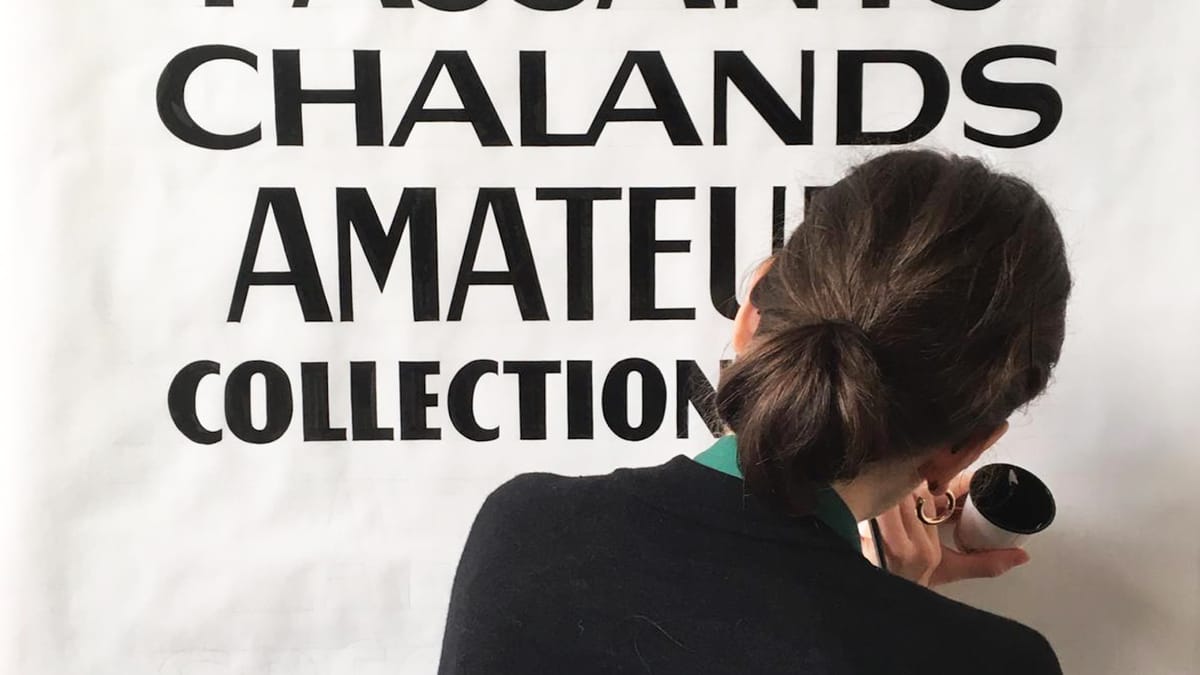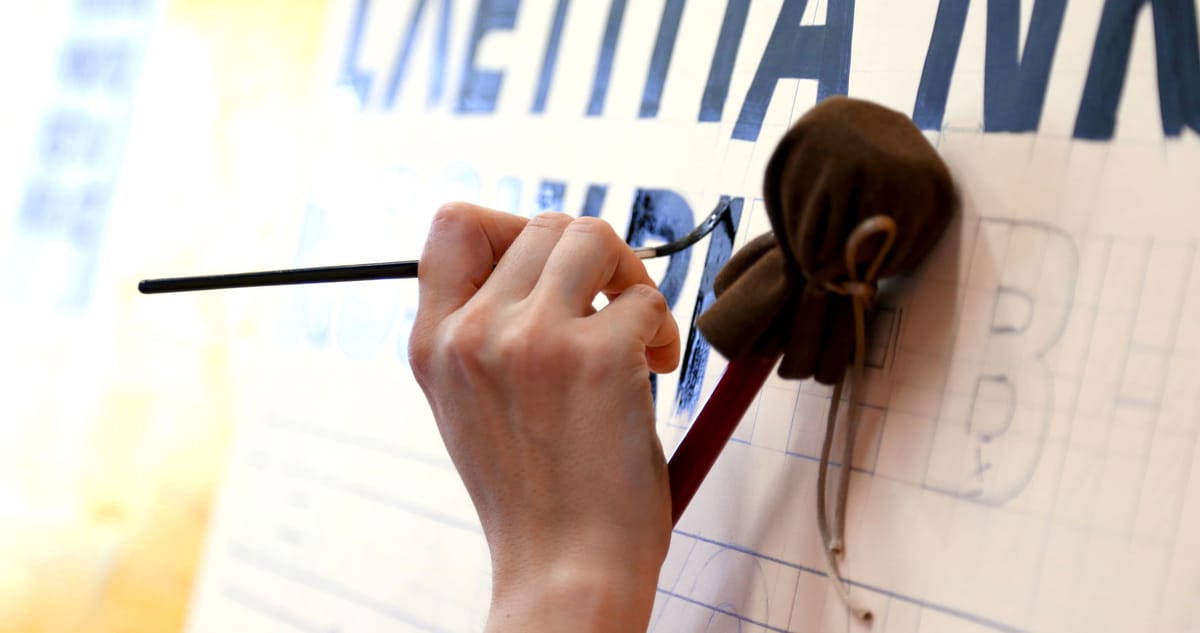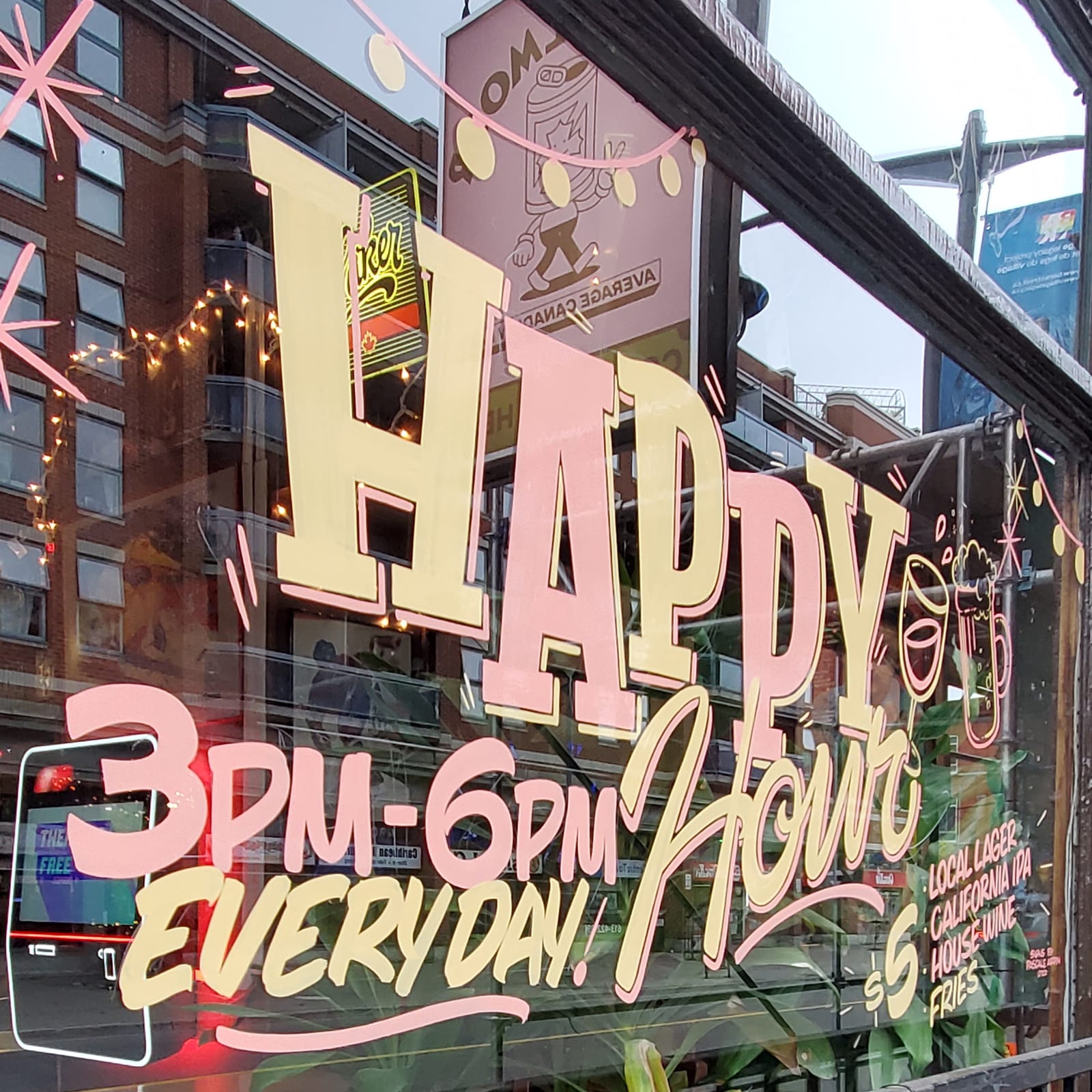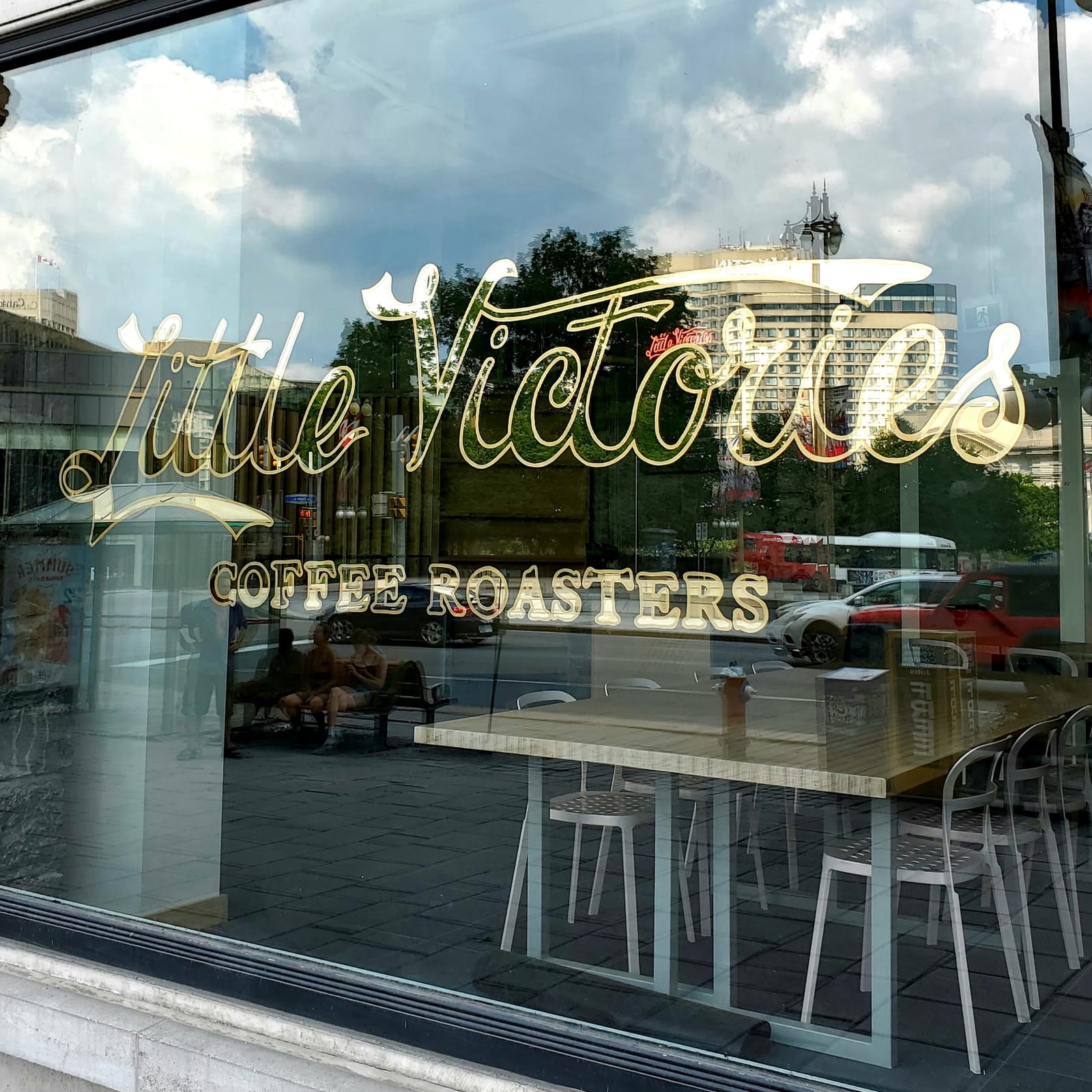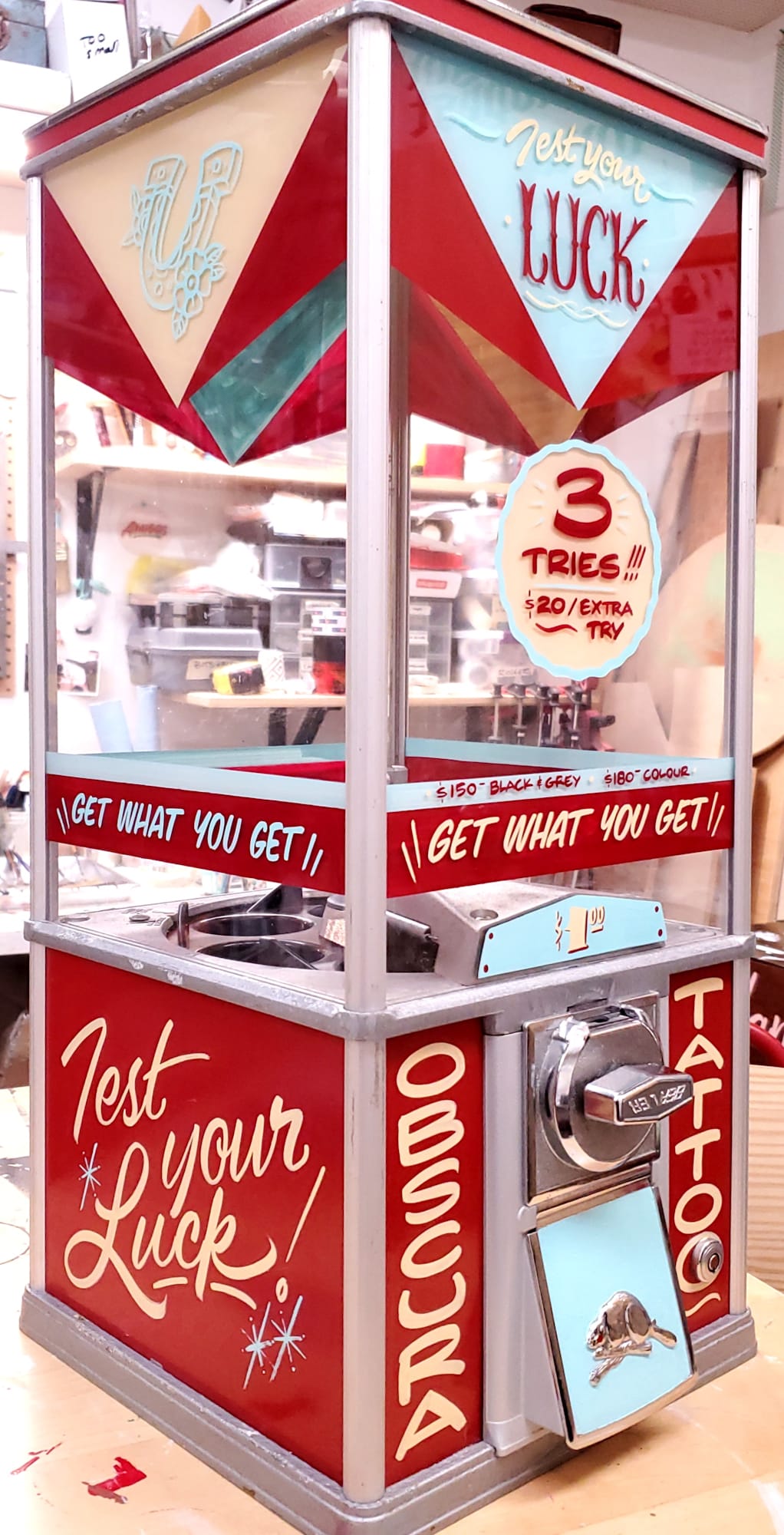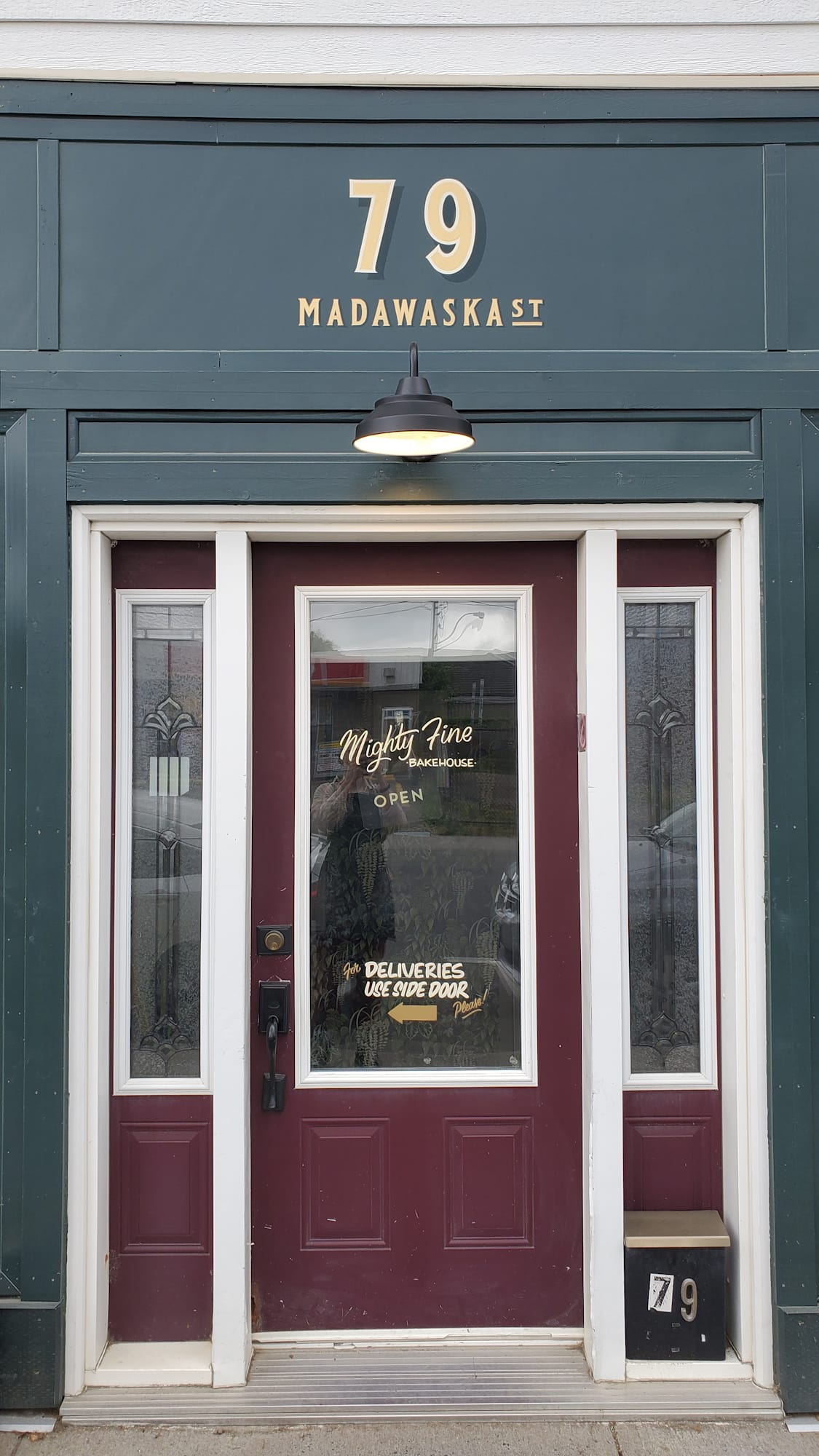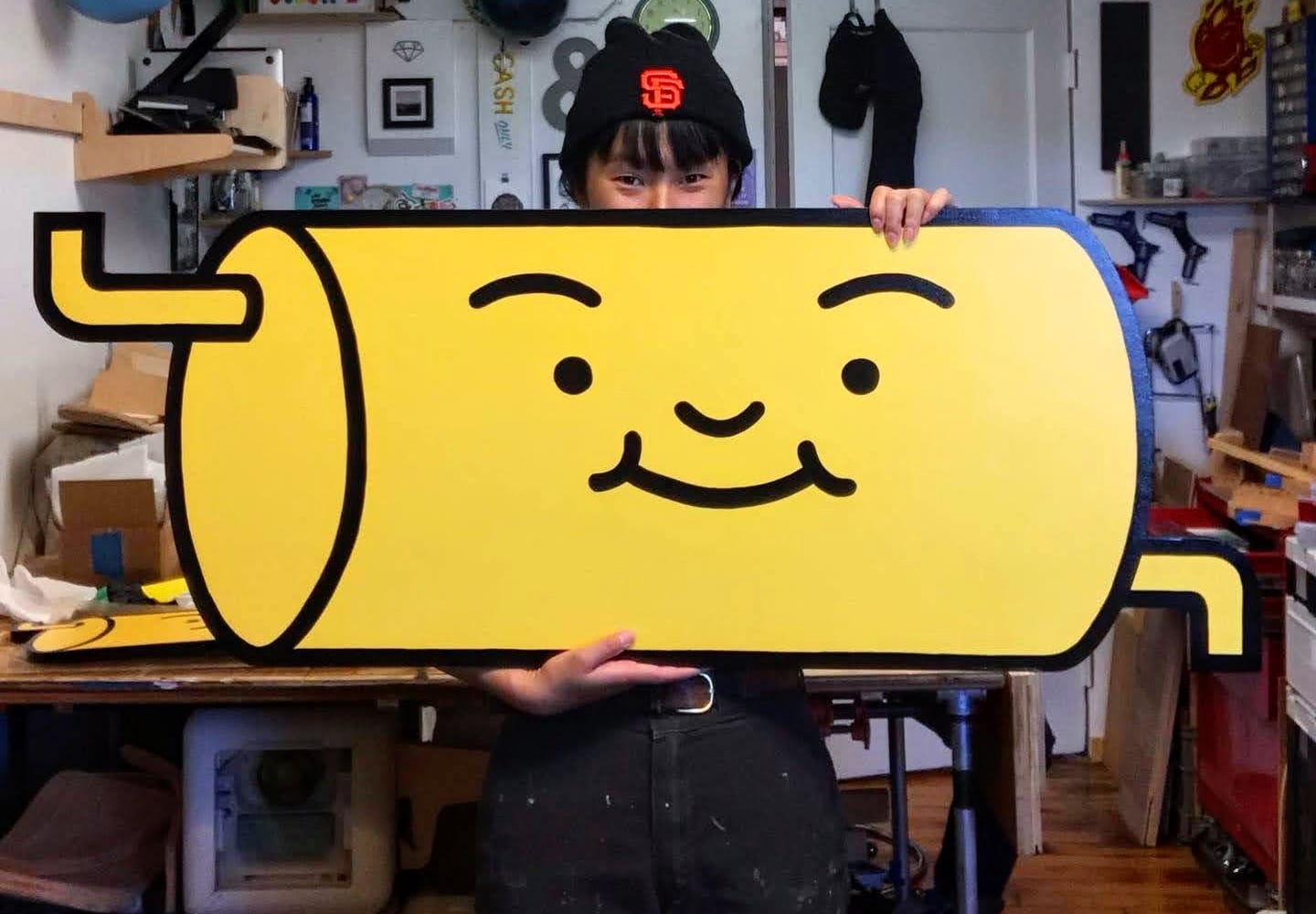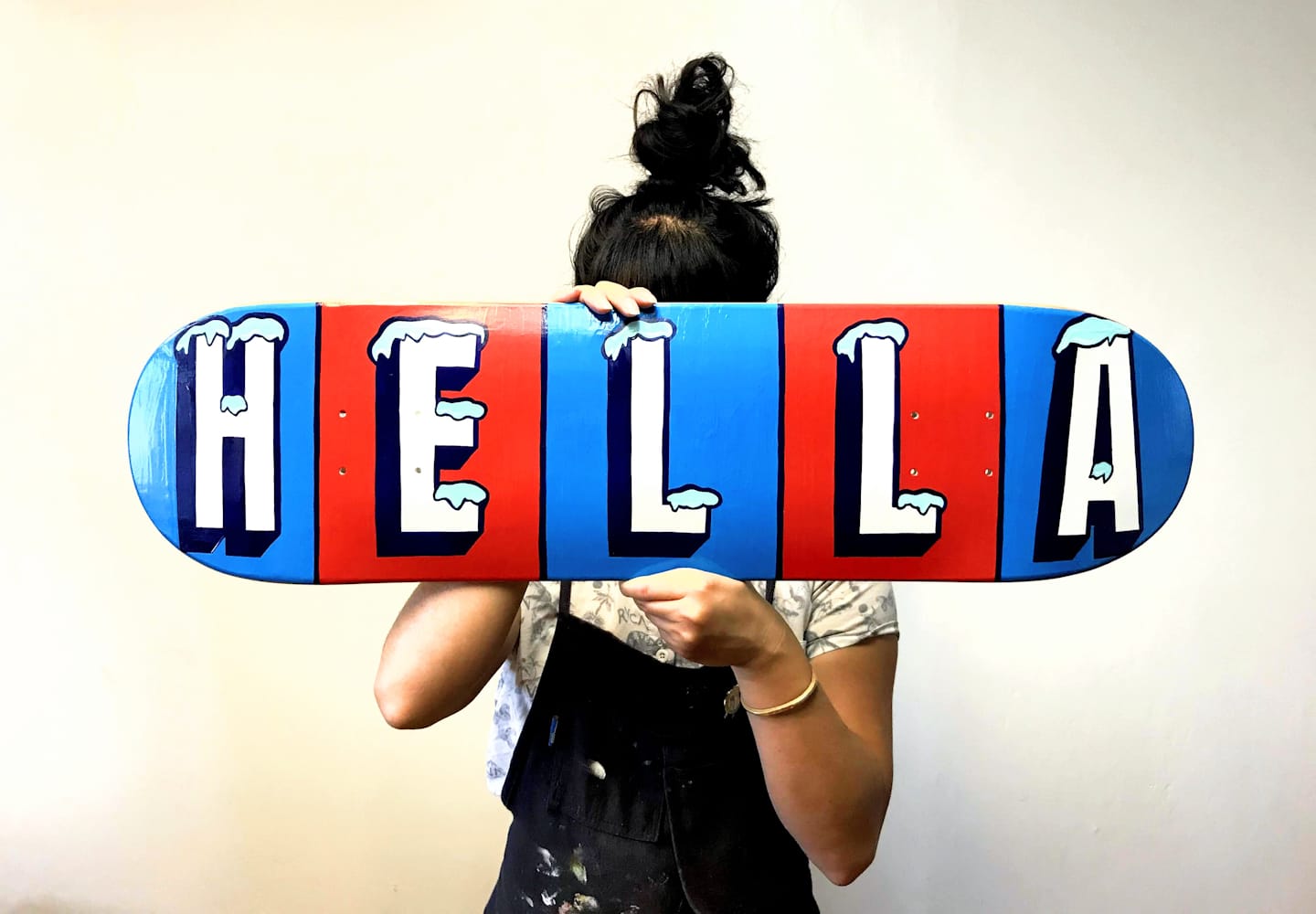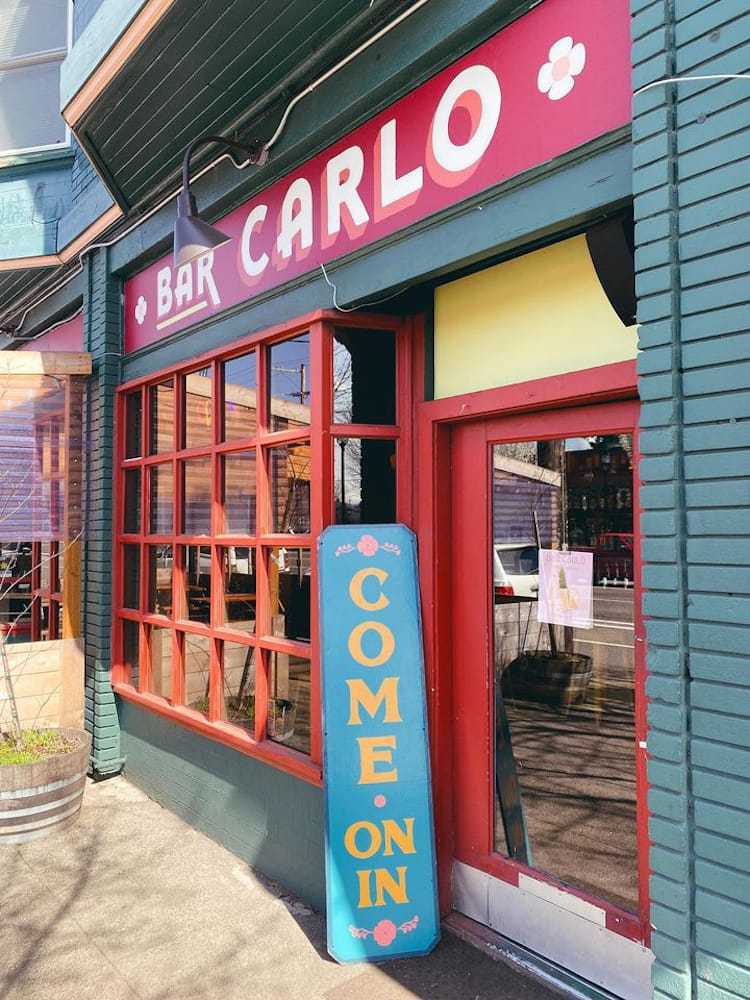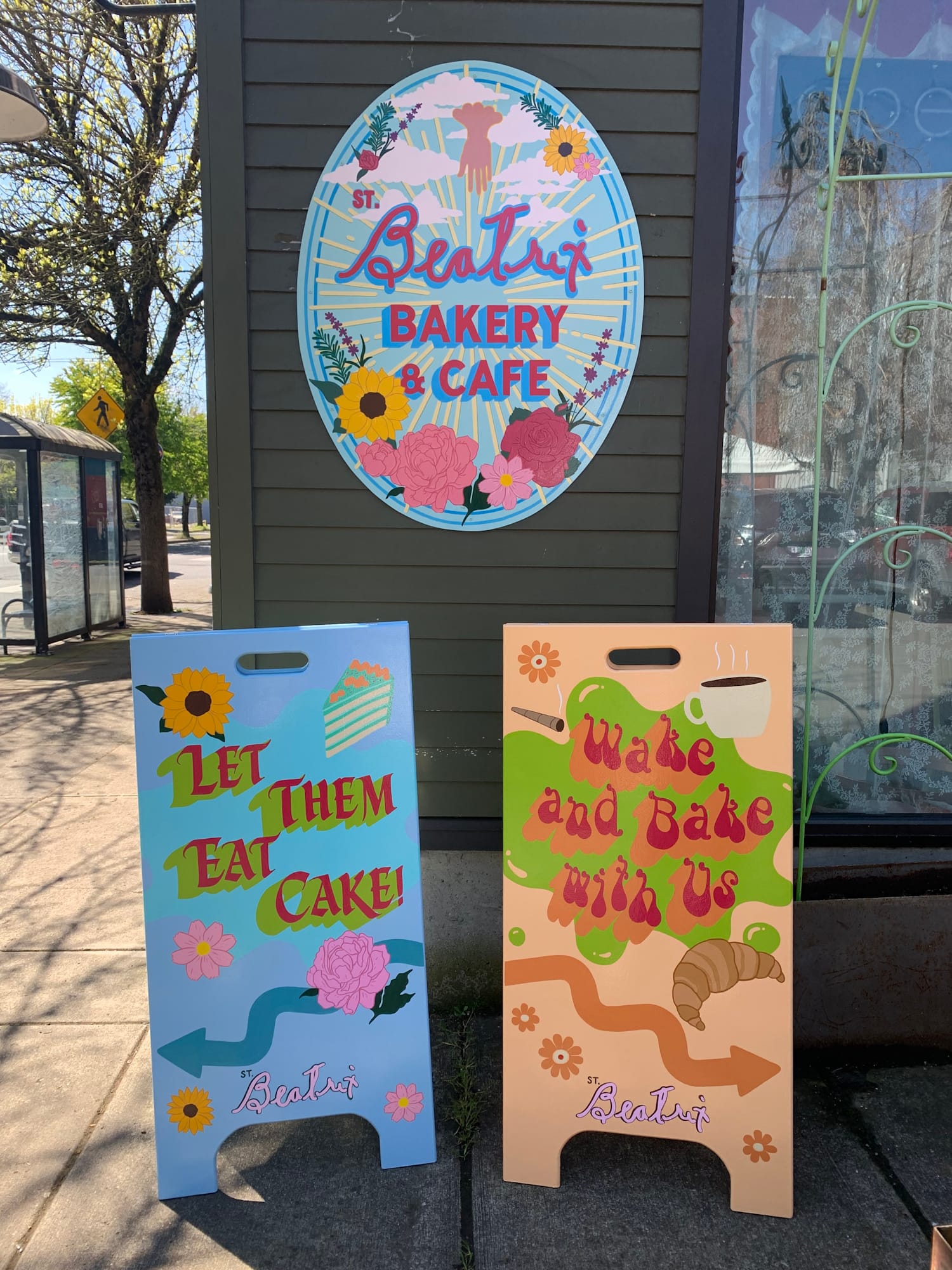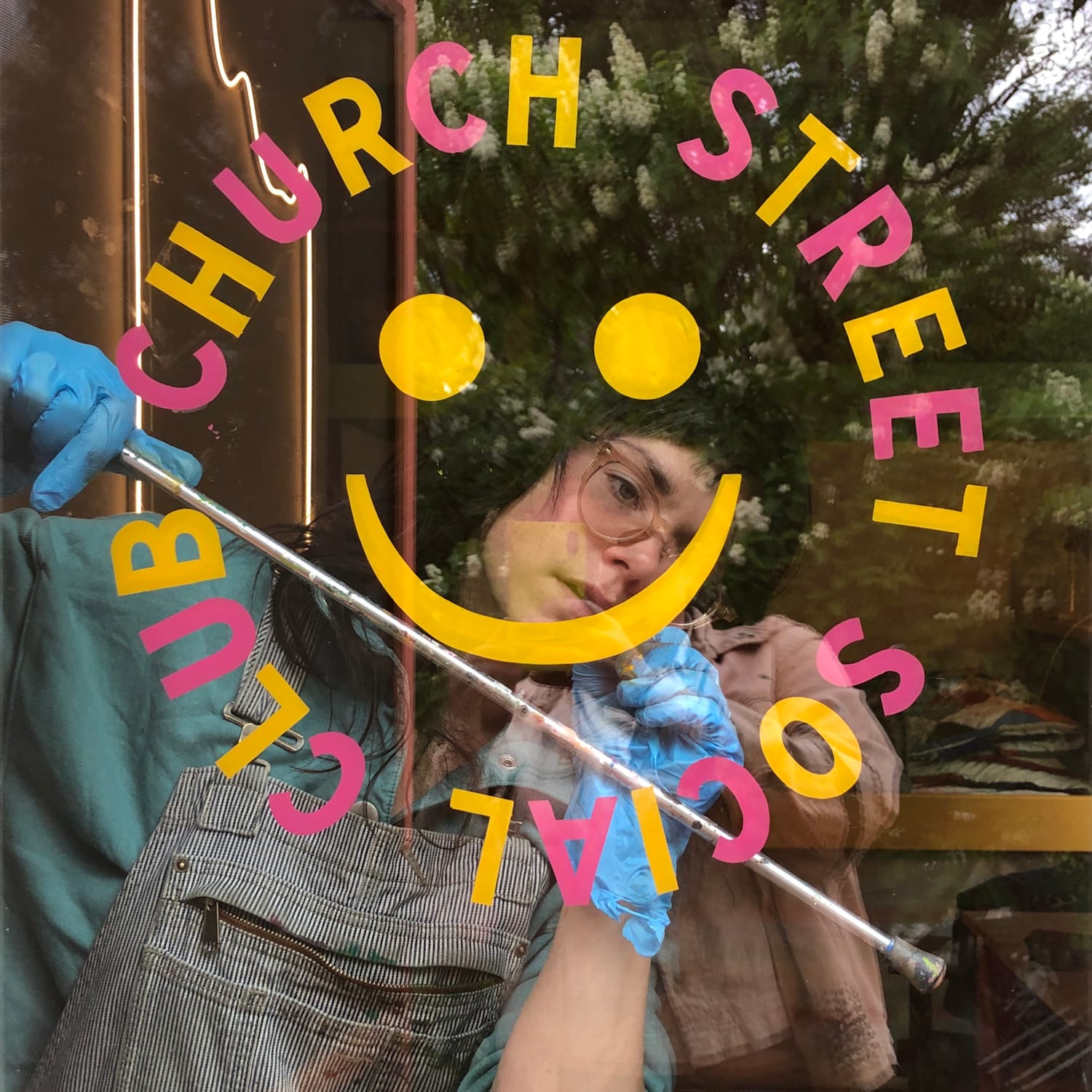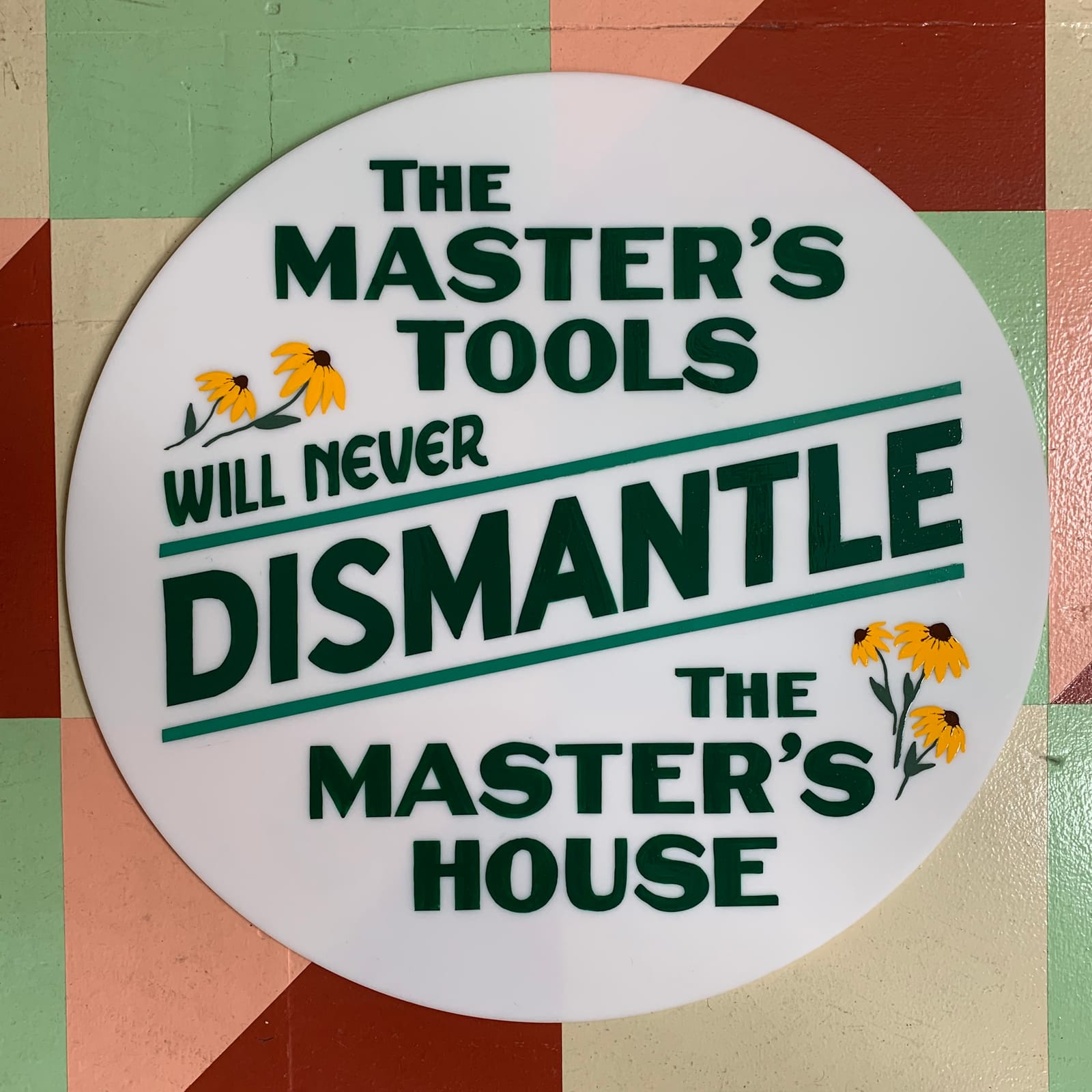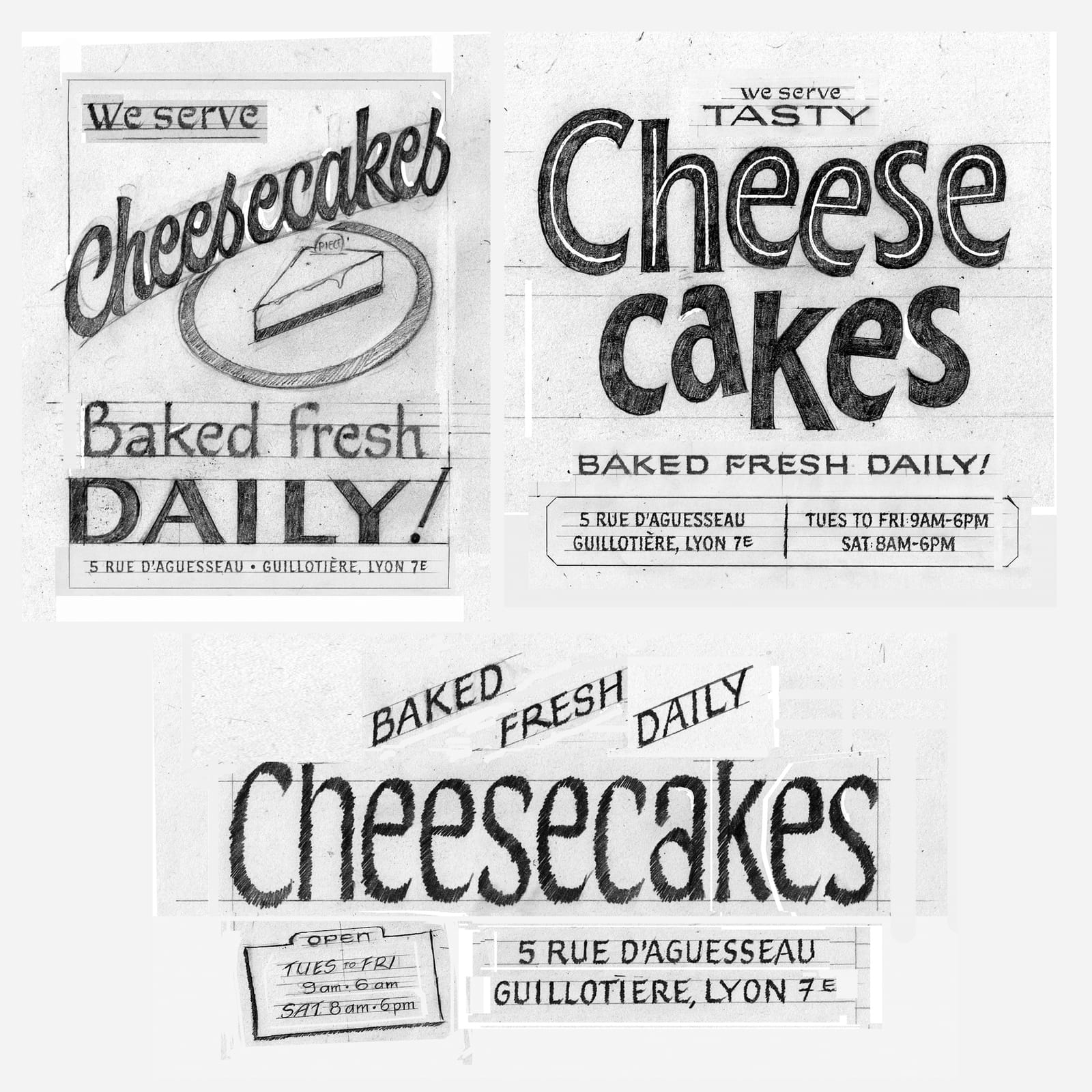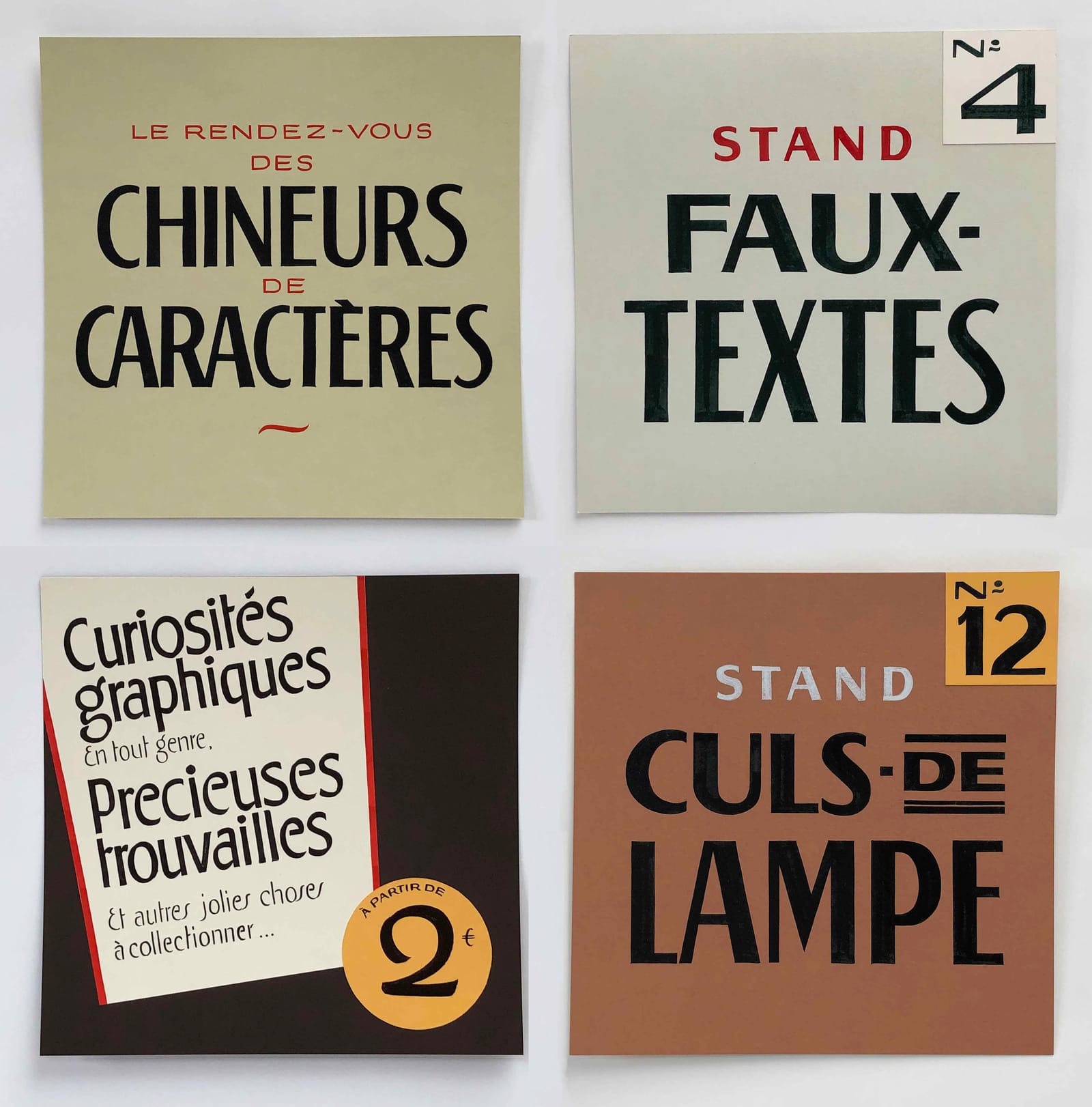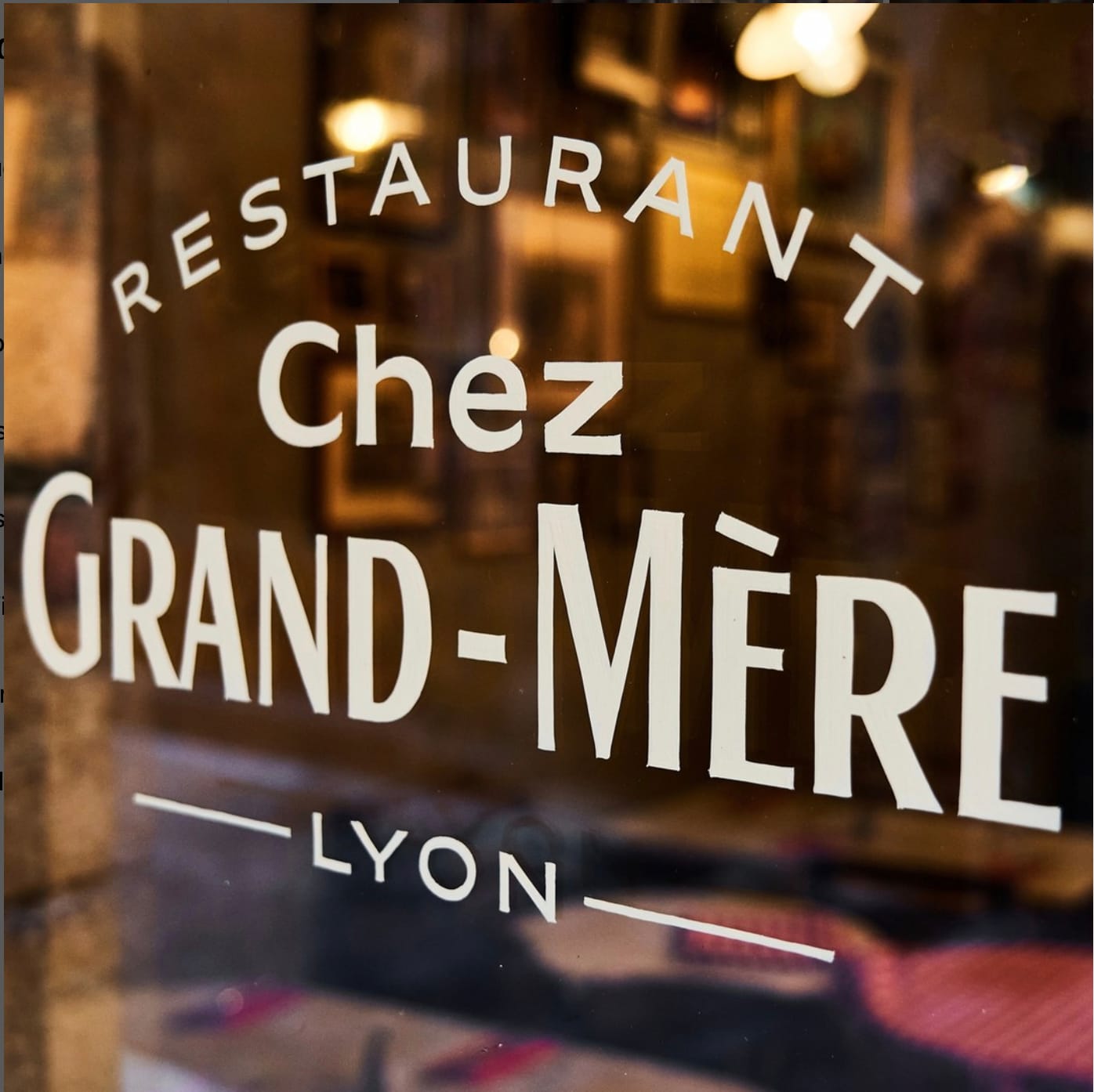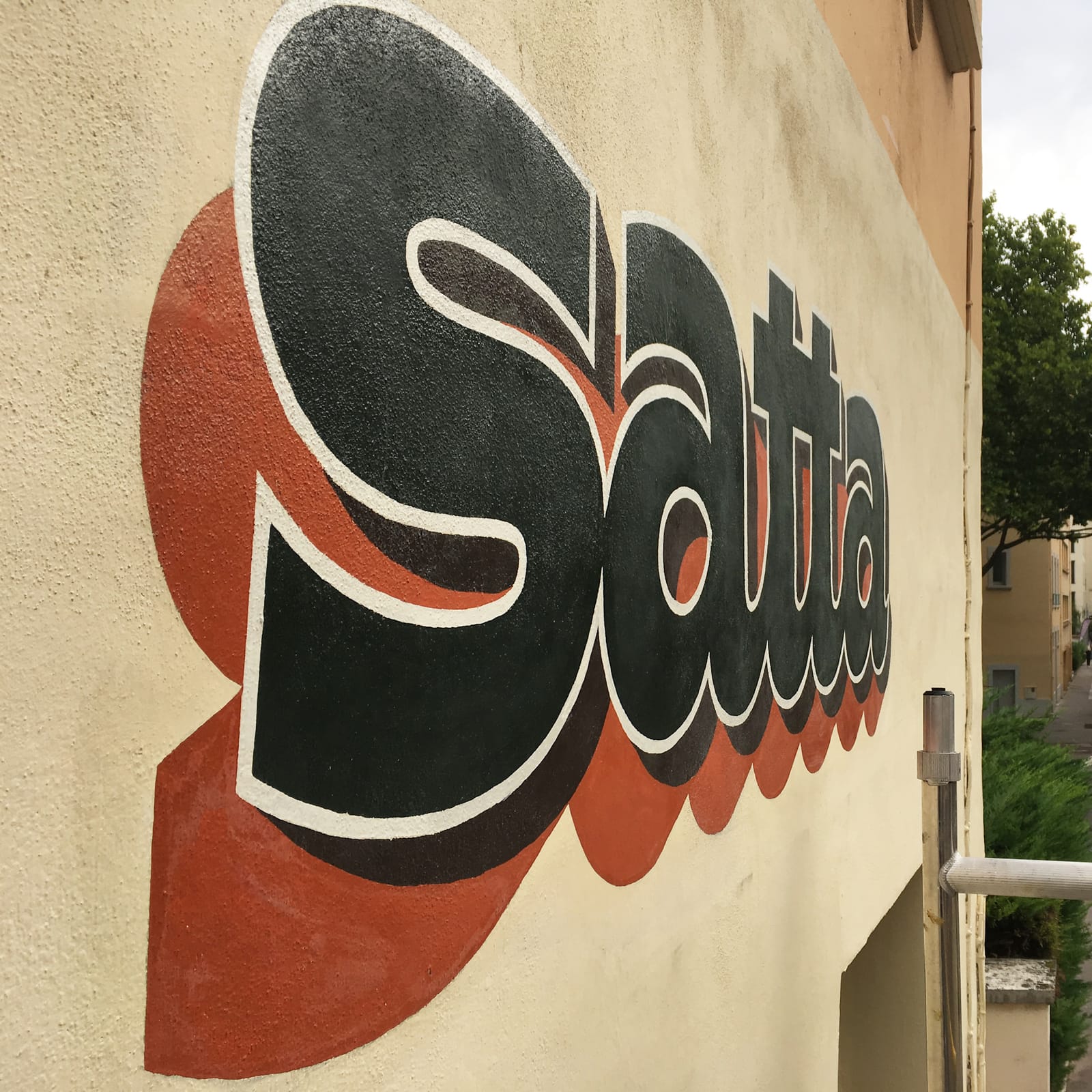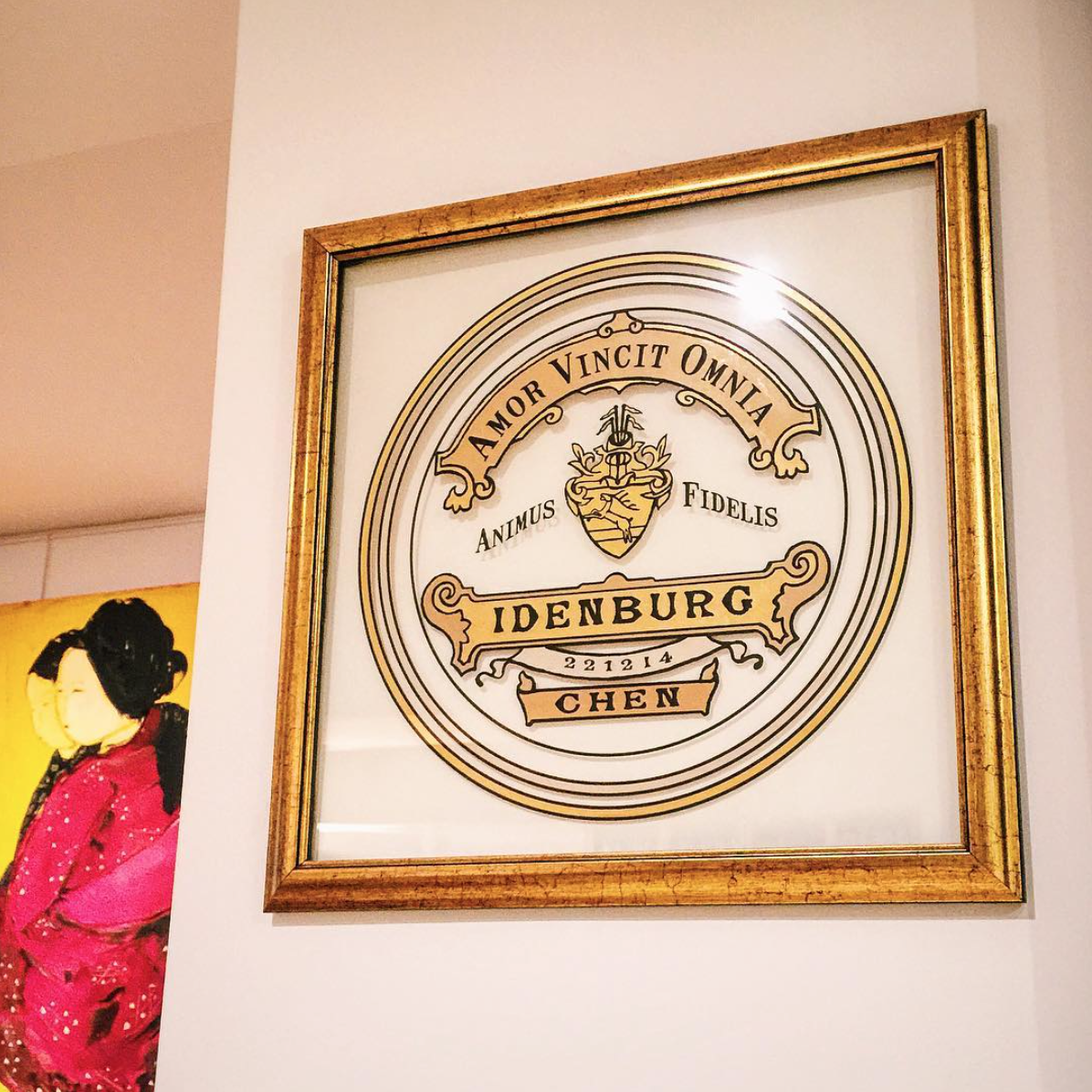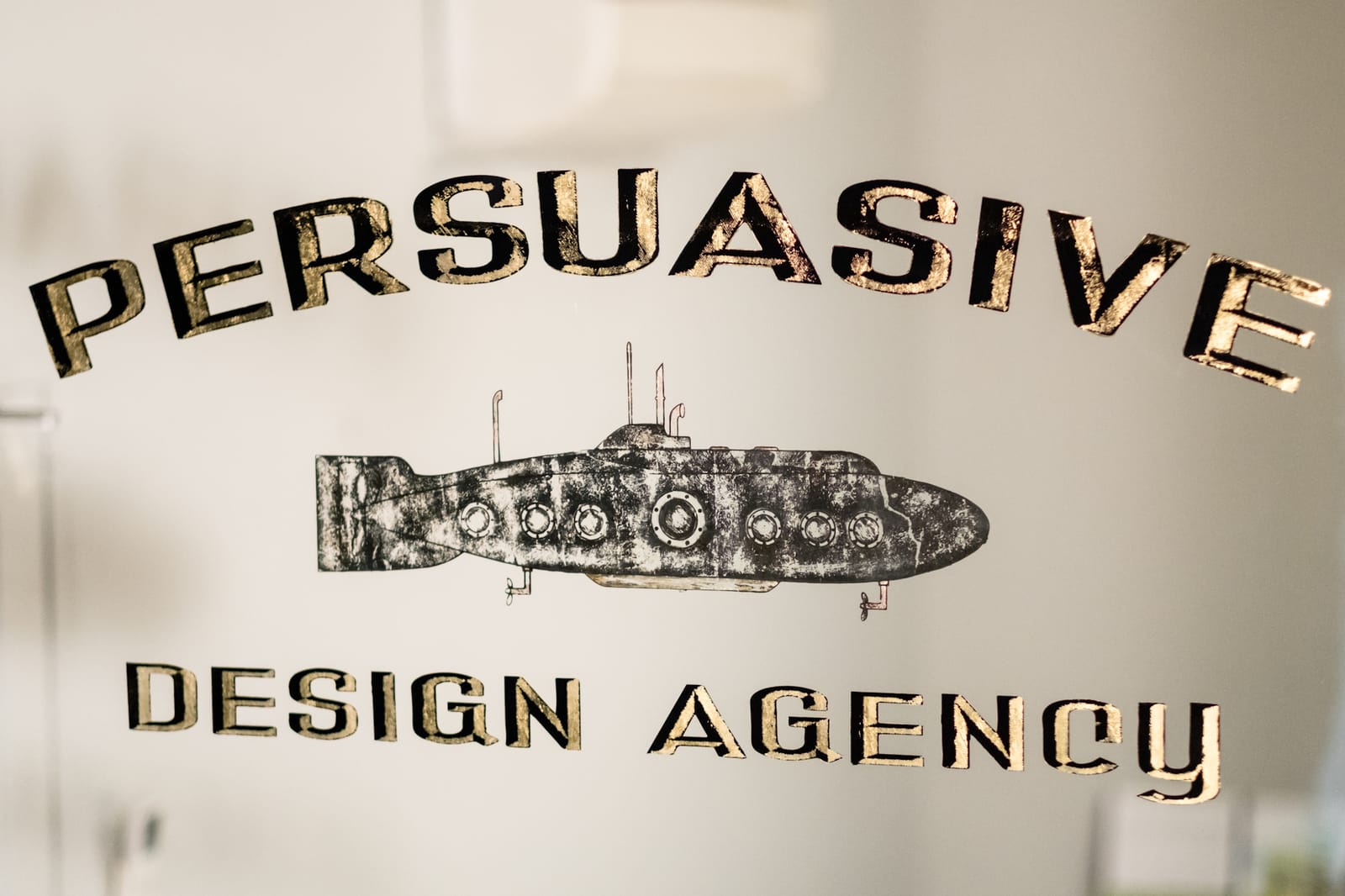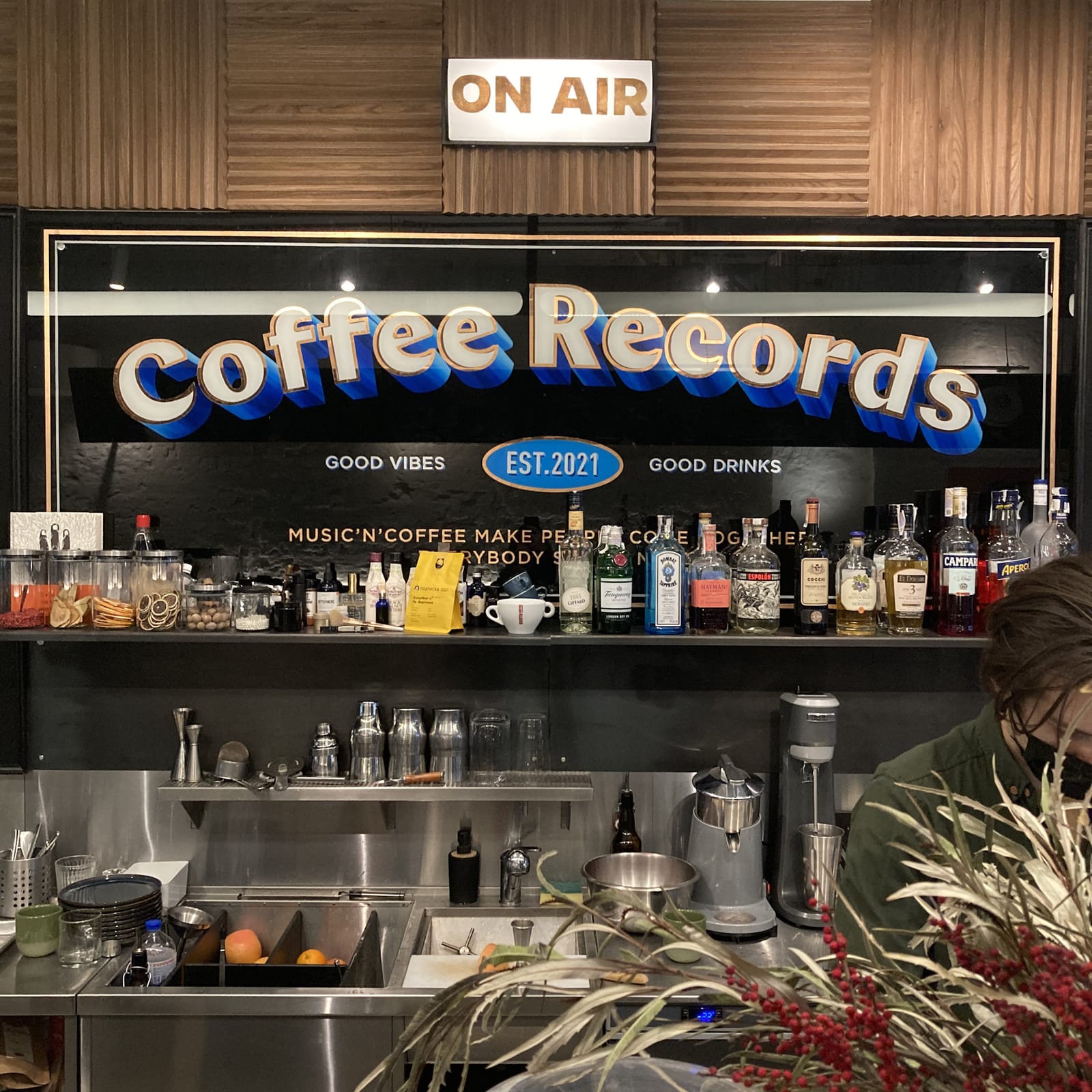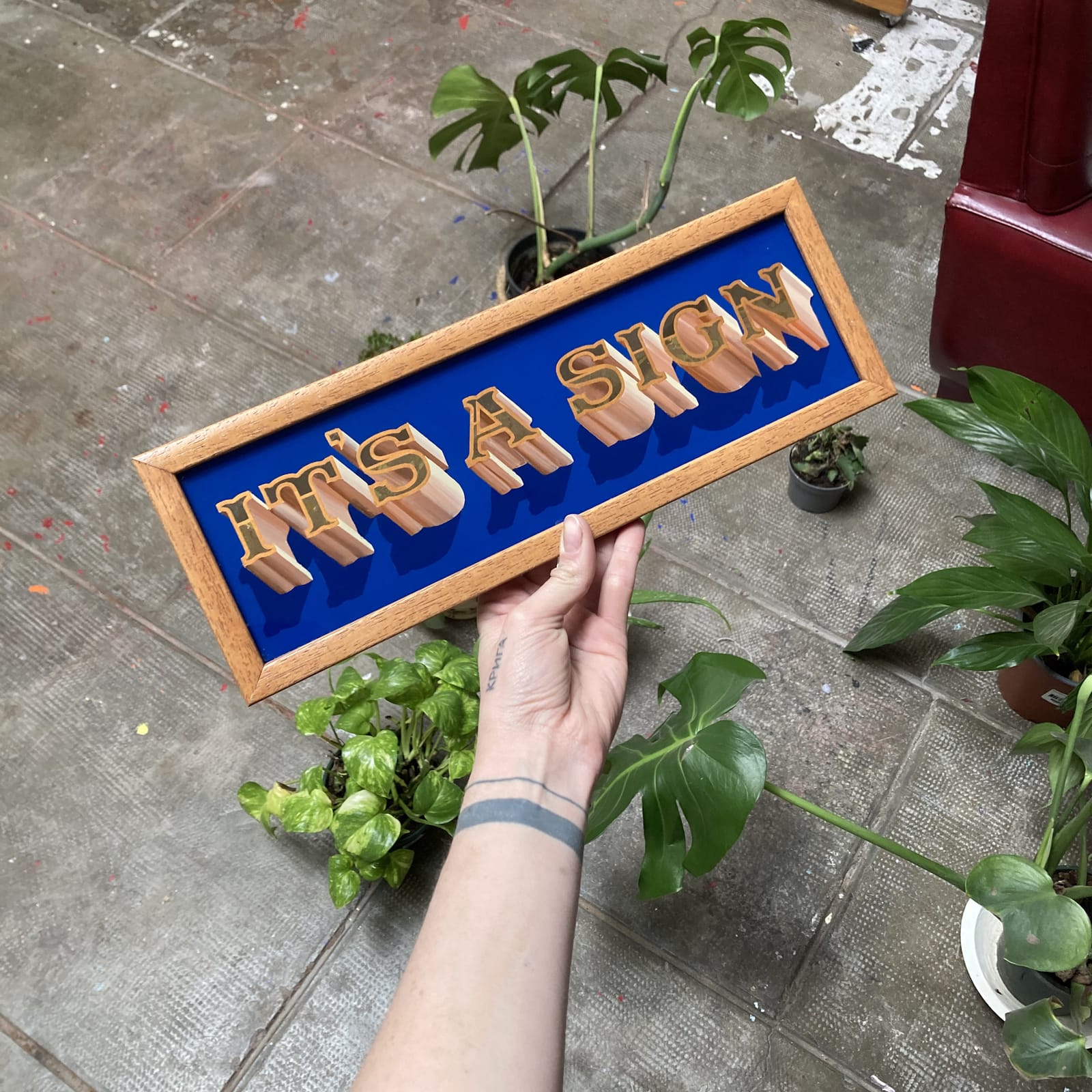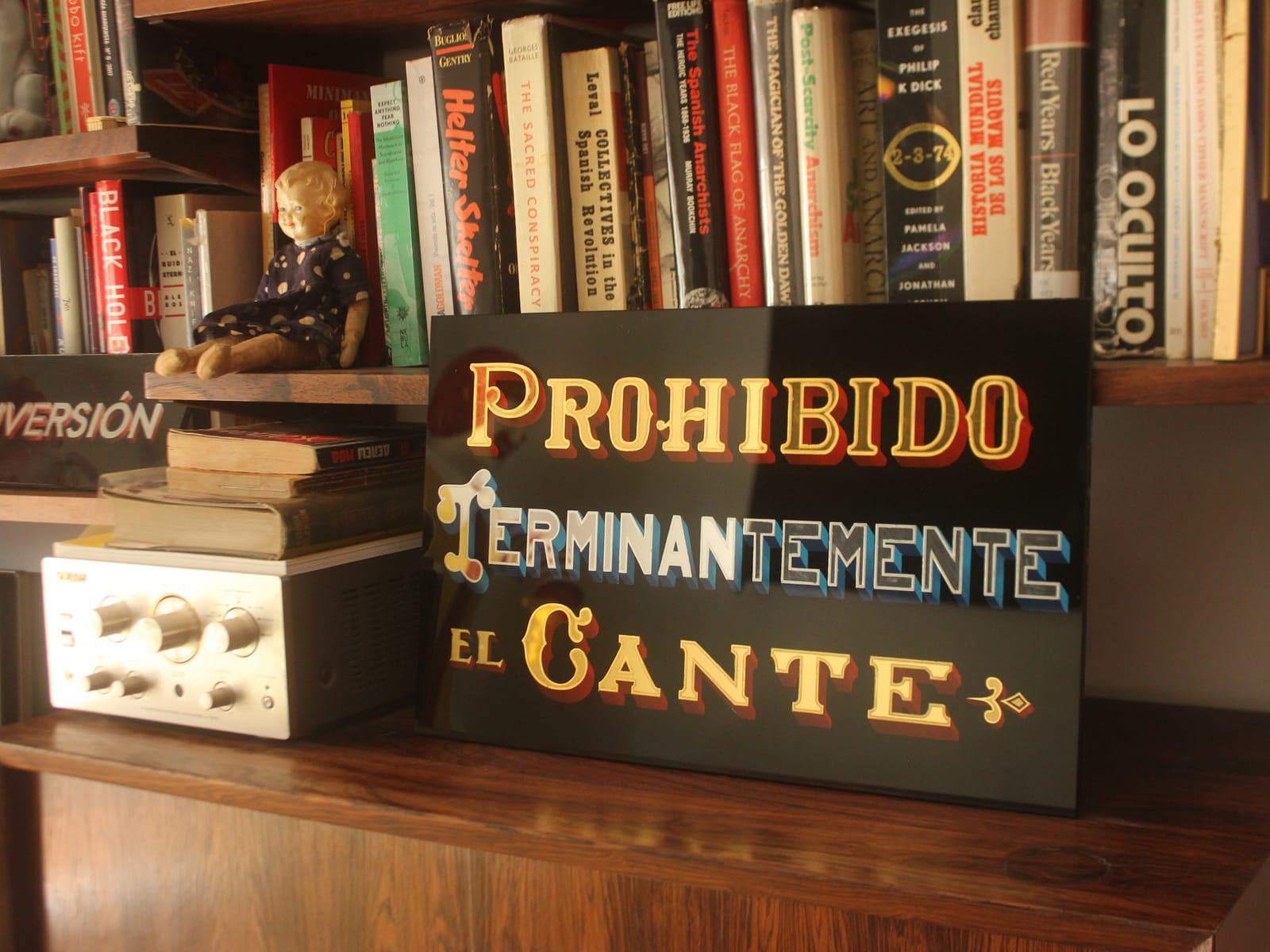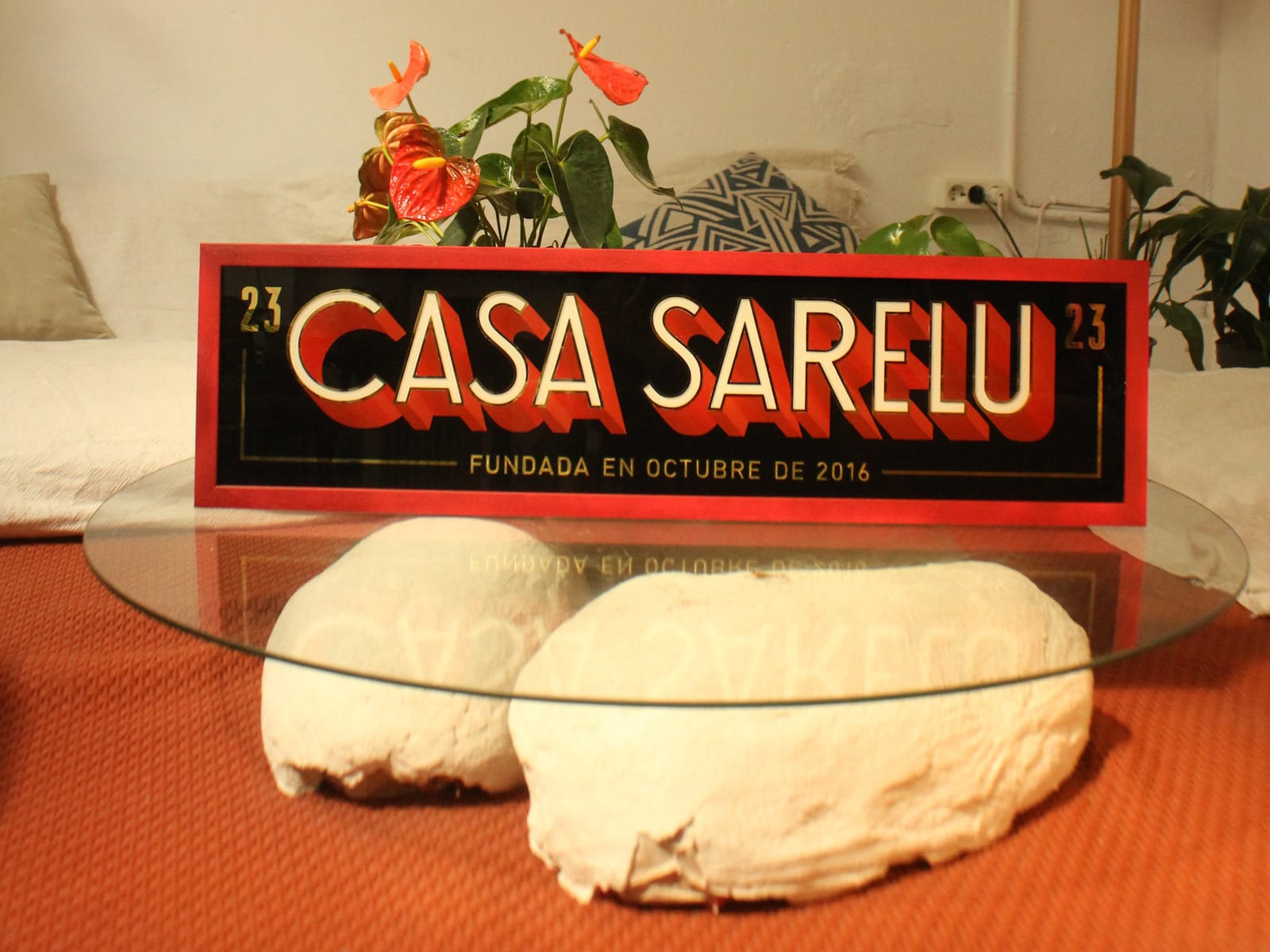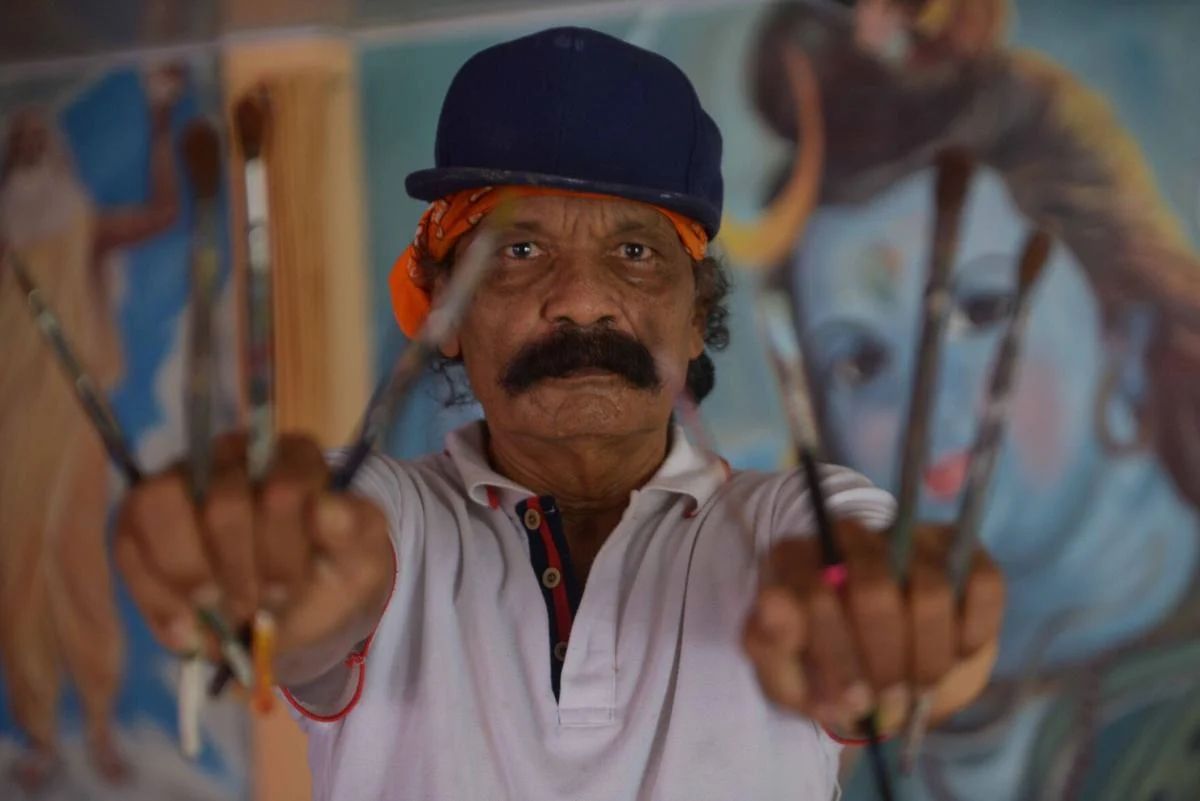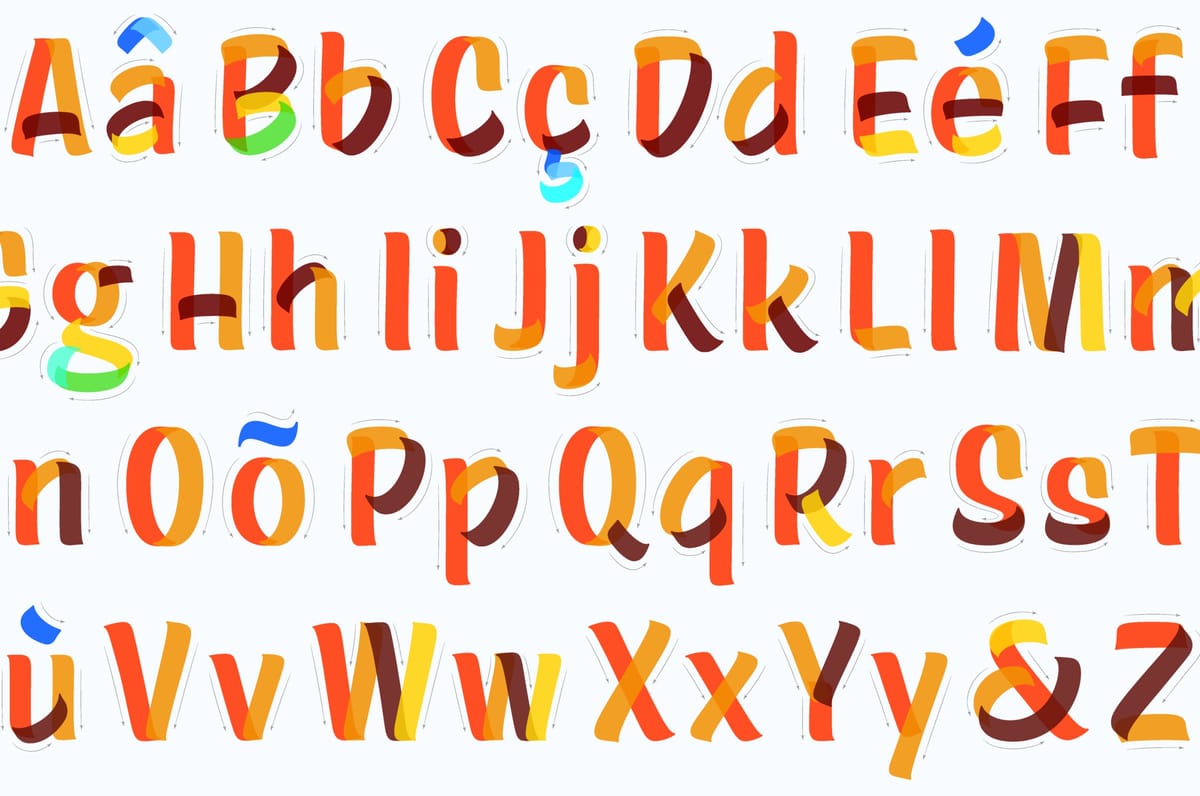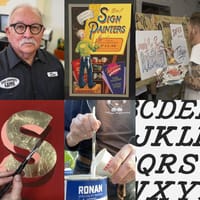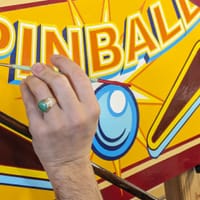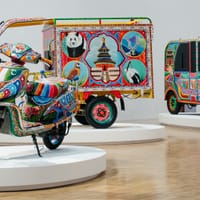Happy new year from BLAG, wishing you all good things for 2024. To help get the year off to the best start, join today for just $95, including Issues 03 and 04 shipped to you straight away.
As more and more folks quit their old or part-time jobs to go full-time at sign painting, Lauren Kerbel (@torontosignpainter) talked to six painters from around the world to learn about their paths into the trade. If your resolution for 2024 is to finally pick up the brush, or to go full tilt at sign painting, then these stories should inspire you, give you some practical guidance, and a reality check in terms of challenges that might lie ahead. Once you're fired up and ready to go, make sure you have a copy of the Sign Painting book at your side, and check out the various opportunities to learn the craft in-person and online.
Pascale Arpin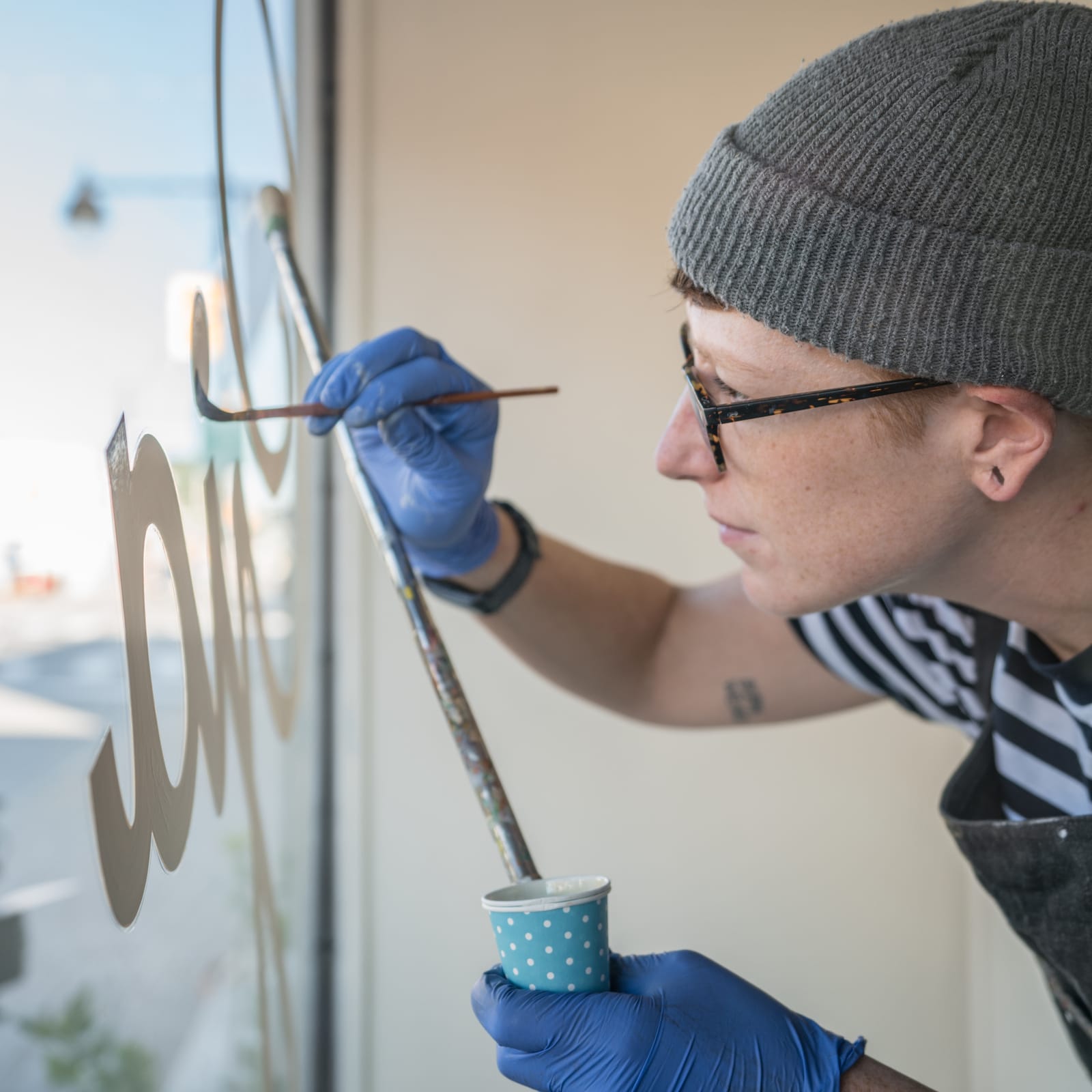 Pascale Arpin on the brush. LocationOttawa, Canada Years in the TradeSix TrainingWhat did your career path to sign painting look like?I started painting signs in film and television, but in 2016 I began questioning whether I wanted to continue as the hours and daily demands are gruelling. I developed an appreciation for moments when art directors would give me the task of painting signs: it meant I could go off and focus on painting beautiful letters. As a self-taught painter and illustrator I was able to copy letters, but without any understanding of letterforms or traditional sign painting techniques. Driven by an interest in learning how to paint signs the 'real' way, I decided to leave film and focus on acquiring this new set of skills. I found a website advertising a four-day workshop by Mike Meyer and drove over 20 hours from Ottawa to Mazeppa for it. The feeling I had when I walked into Mike’s shop has stayed with me to this day. Happy Hour at Gilmour Bar (2022), sketched on site and painted with 1 Shot enamel; and Little Victories (2021), produced using 22.5 carat gold and varnish on glass. Mike and I instantly got along, and a few days into the workshop he told me he needed an assistant for his next tour. I agreed instantly, and toured around the States with Mike for the next few years. I was learning so much, picking Mike’s brain constantly and meeting sign painters throughout the USA, and internationally at Letterheads meets! My time touring with Mike came to a natural end as I was getting too busy with sign work at home. I’ve been painting signs full-time ever since in over 100 locations. The really fun thing is that now I often get hired to paint signs for films. It feels like I’ve come full circle—except that I can now offer my services on terms that are much more beneficial to my sanity! Two projects from 2023: Gumball machine for Obscura Tattoo, designed freehand and painted with 1 Shot enamel; and hand-painted entrance and door for Mighty Fine Bakehouse, also painted with 1 Shot. What challenges have you faced while working in the trade?Ottawa doesn’t have many options for affordable studios. I worked out of my apartment for the first two years and then finally found a studio that meets most of my needs. The building is old and my room is poorly ventilated with no windows, but there are so few options that it is truly the best I could find and afford. Pascale Arpin / @pascale_arpin
Michelle 'Meng' Nguyen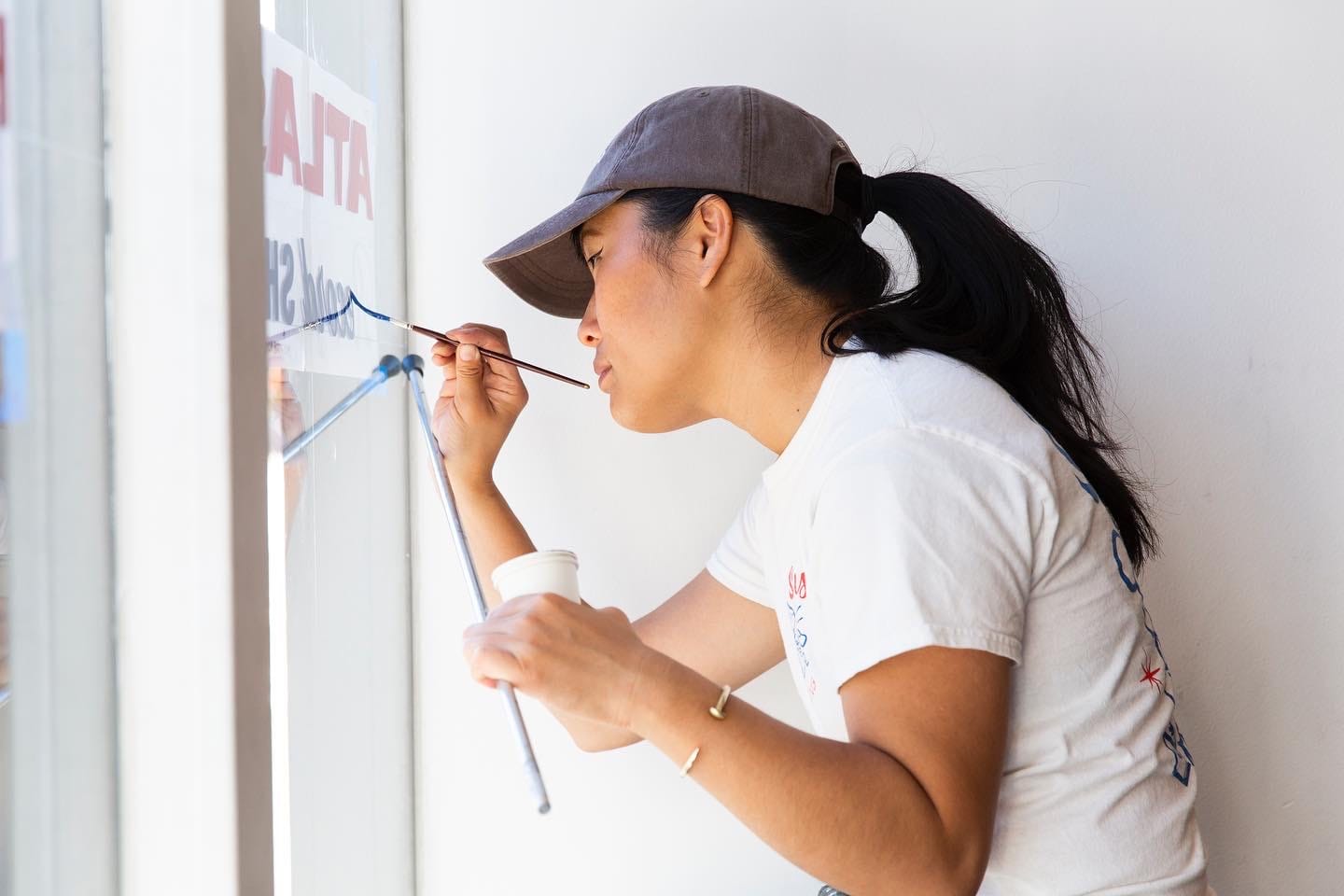 Michelle 'Meng' Nguyen on the brush for Atlas Skateboarding. LocationSan Francisco, USA Years in the TradeEight Training- College for design
- Workshops with Damon Styer from New Bohemia Signs (@nbsigns)
- Workshop with Mike Meyer (@this_is_the_real_mike_meyer)
- Grocery Signage Workshop with John Downer at LA Trade Tech
- Lettering with Emmanuel Sevilla (@emmanuel.sev)
- Various meetups
What did your career path to sign painting look like?While in college for design, I worked as a cashier and stocker at a grocery store. When their previous sign maker moved on, I jumped at the opportunity! Already obsessed with illustration and letterforms growing up, I would make signs with chalk and markers in between being at the register and stocking products. After several internships, fellowships, and failed attempts at getting a design job, I had a friend recommend another sign making gig, except this was full time! It wasn’t a design job but I was putting my skills for layout, type, and colourways to use. I also started taking on clients of my own. Cut-out logo adaptation of the logo for the Golden Auto Muffler & Brake Center, and a skateboard deck with San Francisco bay area slang in a frozen slushy style. The board was painted for the San Francisco skate club's art fundraiser to support their after school skateboarding programme for youth. At first it was all chalk and markers—I had never painted before and found it to be intimidating with its perceived permanence. I pushed it off for a while before giving in to a workshop at New Bohemia Signs. Once I took that class, there was no looking back! Painting became a part of my daily practice and I incorporated more of it into my signage at the market. I was incredibly lucky to have had employers that valued my skills and invested in my growth during my time there. They paid for several trips and workshops for me to learn other styles and techniques too! After three years at Canyon Market, I felt like I hit a cap of what I could learn there. I decided to take a chance and turn to New Bohemia Signs to see if they had any job openings, which they did! The diversity, scale, and height of the projects I got to do exploded immediately! I spent almost four years learning from and painting alongside many amazing people at New Bohemia. 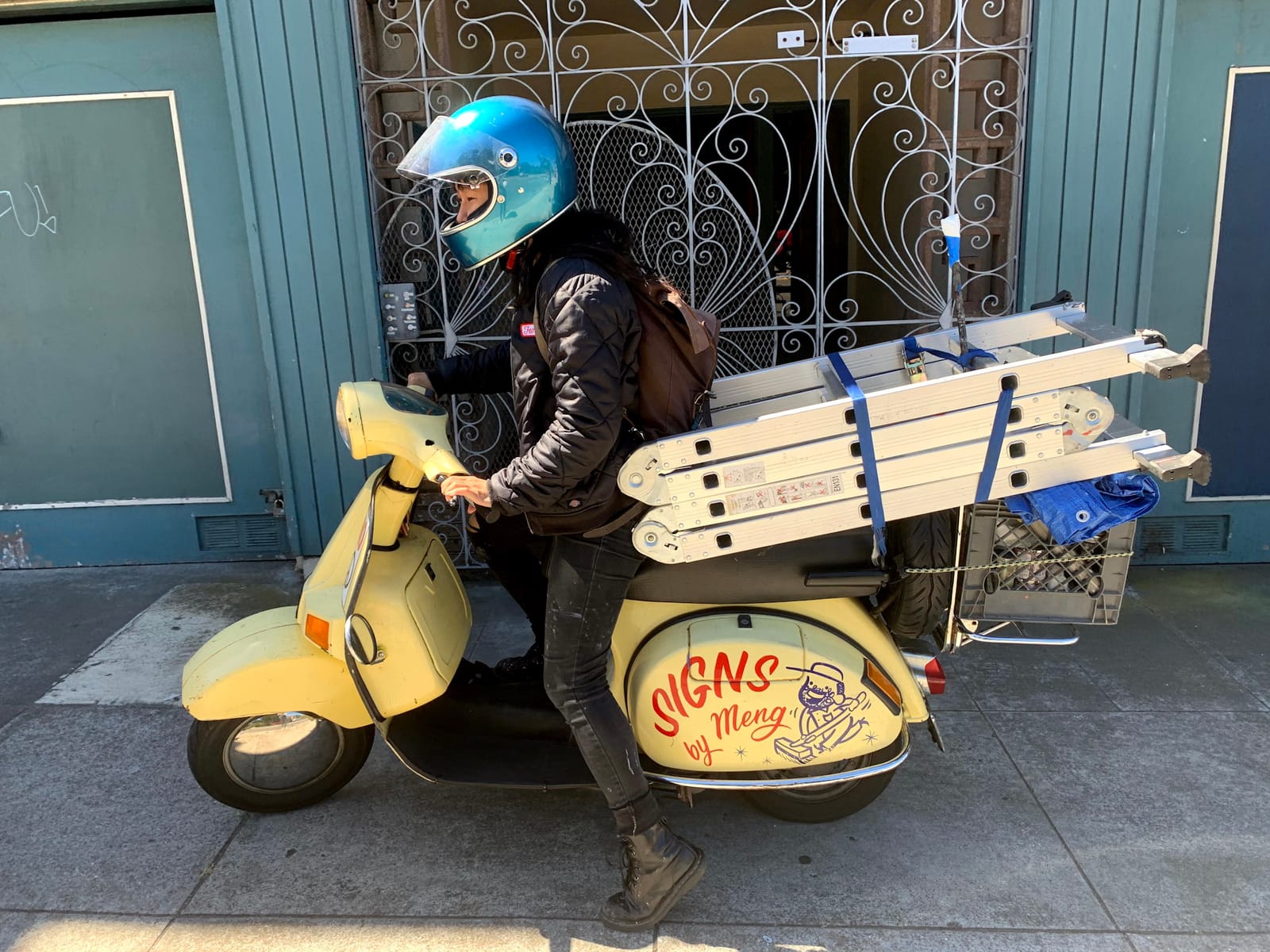 Signs by Meng packing a punch on two wheels. When I started there, I juggled work with freelance projects, as well as bartending a couple nights a week. When Covid shut down all non-essential establishments I realised I could make up the difference with my own projects without bartending. By then, I was lucky to have enough clients to keep me afloat along with working at New Bohemia. Which in turn made for an easier transition to go solo from there after a couple years. What challenges have you faced while working in the trade?When I was first starting out, I was invited to The Pre-Vinylette Society: An International Showcase of Women Sign Painters. I enthusiastically shared the event in a sign painting forum and was instantly met with criticism and backlash. It was gut wrenching to see so much negativity towards what was supposed to be a celebration, and I felt responsible for opening the floodgates. 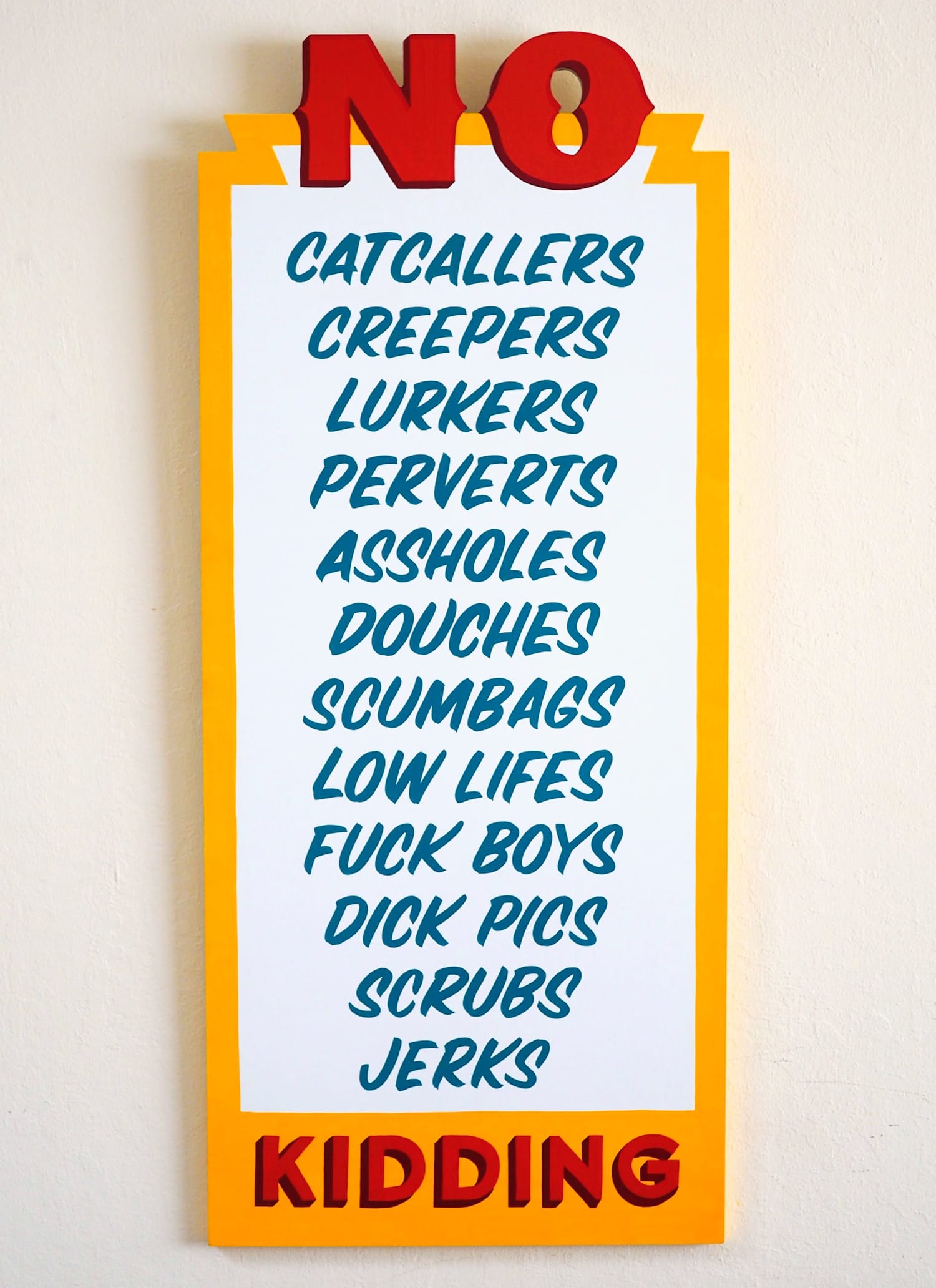 Michelle 'Meng' Nguyen's piece for the 2017 Pre-Vinylette show in Chicago. Just as many words of encouragement followed, which reinforced how important representation is in our industry. I was so overwhelmed with inspiration that it led me to curate my own show the following year. But Where Are You Really From?: A Showcase Celebrating Diversity in Sign Painting, highlighted the work of sign painters from different backgrounds. Representation as a woman sign painter was important to me, but so was being a Vietnamese American sign painter. I wanted this show to reflect the diversity that I knew existed in our industry, but was often overlooked. Michelle 'Meng' Nguyen / @allthingsmeng
Kirsten Bauer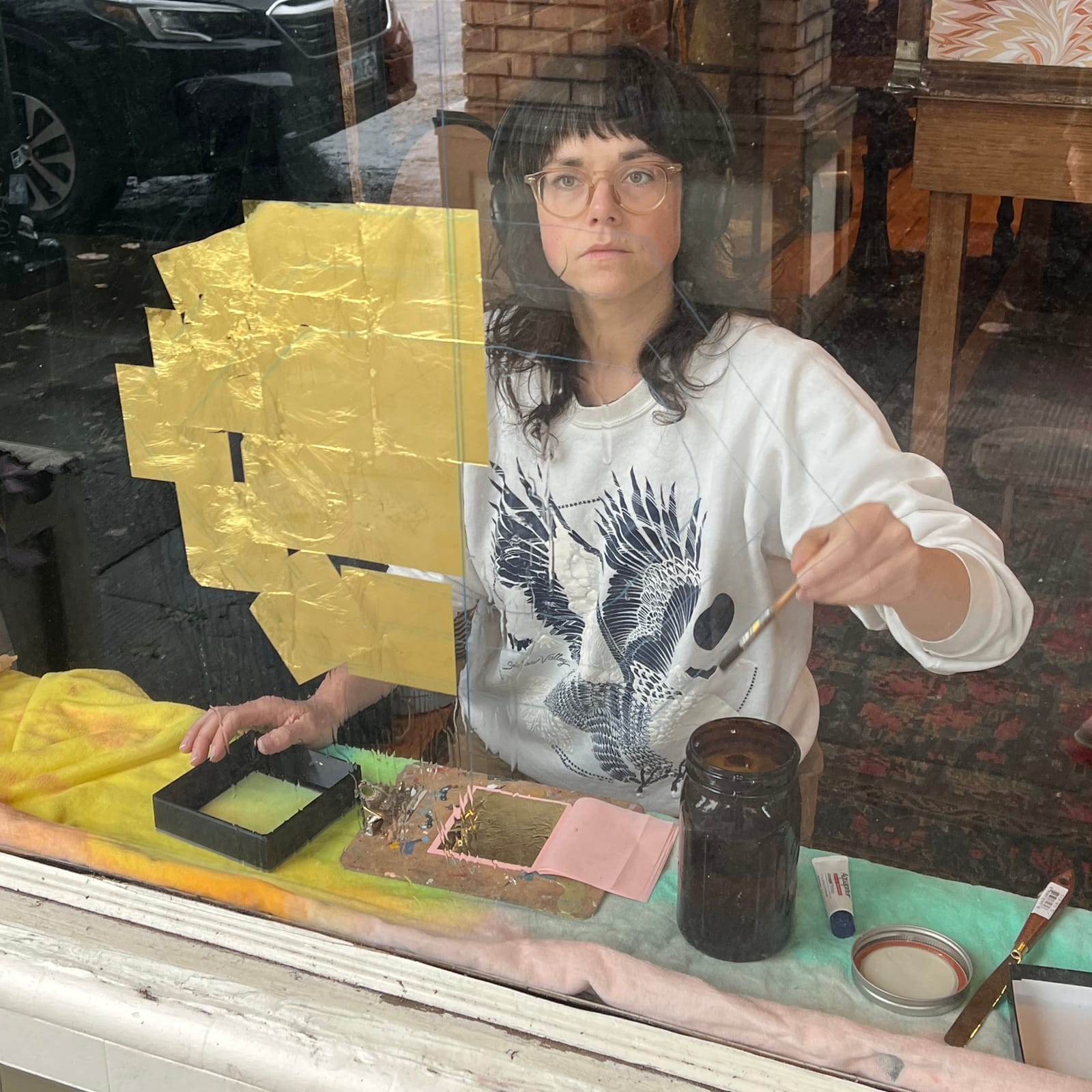 Kirsten Bauer gilding for Oko, an antique jewellery store in Portland, Oregon. LocationPortland, Oregon, USA Years in the TradeSeven Training- Sign Graphics program at Los Angeles Trade Tech College (LATTC)
- Workshops and meetups
What did your career path to sign painting look like?I first studied Art History & English in college, with the idea that I would work for museums upon graduation. I did some educational programming, curatorial work, and museum administration, and then ended up working as a manager for an interpreting and translation agency. It was at this point that I saw the Sign Painters documentary and book. A lightbulb went off in my head, especially when they mentioned the Sign Graphics programme at LATTC. I had been feeling creatively unfulfilled, and the idea of going back to school for a trade was so appealing. I decided to make the move across the United States to enrol in the two-year program, which was one of the best decisions I’ve ever made. Exterior sign work for Bar Carlo, and two double-sided A-frames and wall panel sign for the St Beatrix bakery, all in Portland, Oregon. After attending LATTC, I moved to Portland, Oregon, and started working full-time for a larger fabrication-based sign company as a graphic designer. When the pandemic hit, coupled with some personal life changes, I decided to make the jump to work for myself full-time. I was fortunate to have other sign painters in Portland send me jobs in the beginning, and things naturally progressed from there. What advice would you give to anyone just starting out?Just keep painting and practising! Being able to see your progress is so rewarding, and will instil a sense of confidence in yourself. Viewing each project as a valuable learning experience also really helps reframe things when setbacks arise. Trust yourself, trust the process, and have patience. Kirsten Bauer / @kirsten.m.bauer
Camille Weber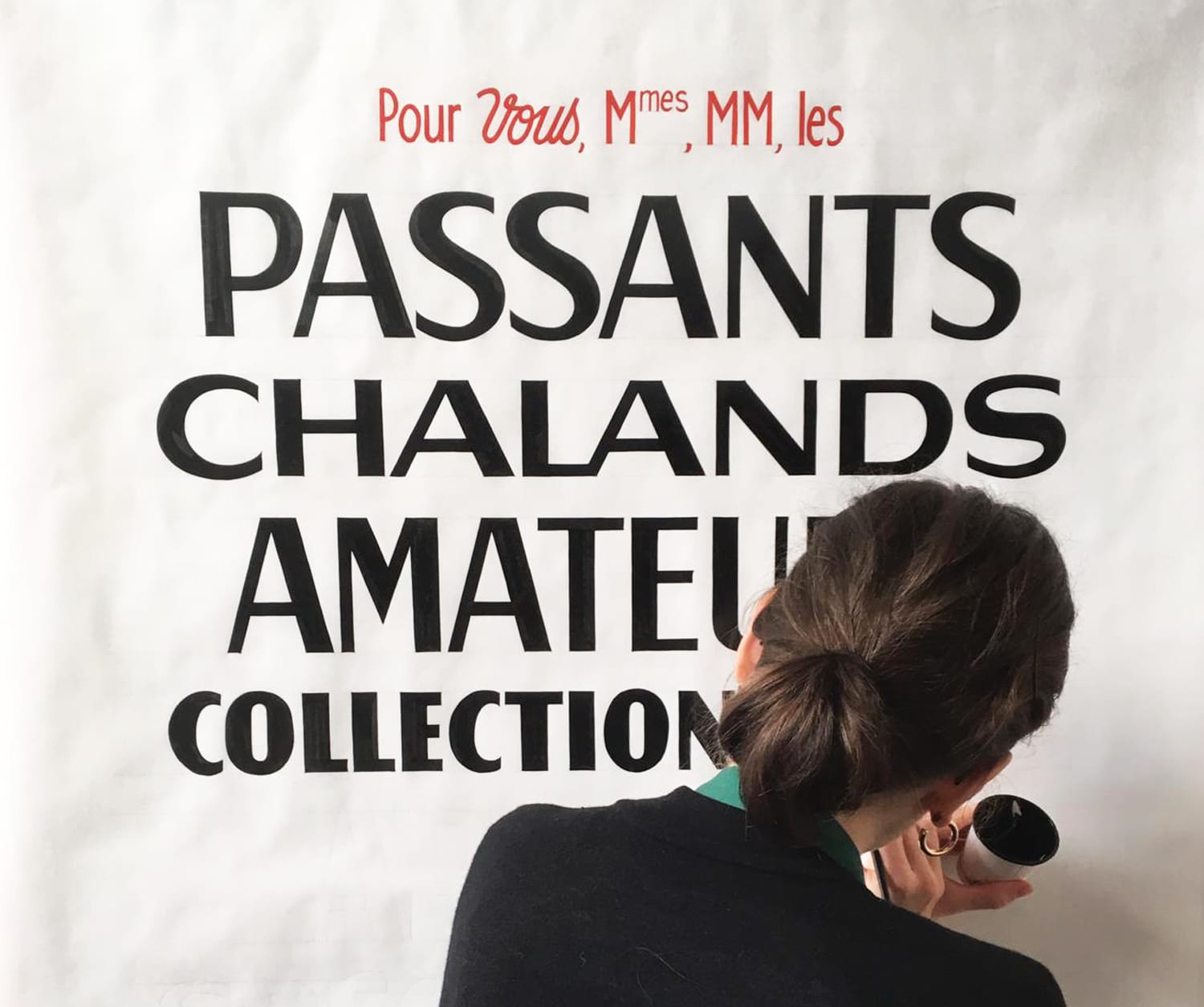 Camille Weber painting a poster to promote an art exhibition at La Galerue, Lyon, France, in 2020. LocationLyon, France Years in the TradeSix Training- Masters Degree in Graphic design at a school for Fine Arts
- Letterheads meetups
- Apprenticeship at Brilliant Signs (@brilliantsigns) in London
- Apprenticeship at Noble Signs (@noblesigns) in Brooklyn
What did your career path to sign painting look like?I discovered sign painting about ten years ago while pursuing my masters degree in graphic design. I chose this field because I was interested in the power of graphic design and how it can play a major role in understanding and interpreting a message. Sketches for a t-shirt design for the pastry shop Piece of Cake! in Lyon, and a series of hand-painted posters for the 2022 Puces Typo event in France. Alaric Garnier (@alaricgarnier), a graphic designer and sign painter, was a student at the same school while I was there and did an internship in Seattle. On his return, he introduced us to what had become a forgotten trade in France. I thus discovered the brush as a wonderful tool for creating letters, and the wide possibilities of expression it offers. Collaborations with Thomas Berthou: shop window for the Chez Grand-mère restaurant, and frontage for Satta restaurant in Lyon. In 2016, I attended the Amsterdam Letterheads with Thomas Berthou (@thomasberthou). We did our first sign painting workshops and discovered the wonderful community of sign painters. Several months (and hours on the brush) later, we started working together and have run a sign painting company ever since. Over the years I’ve also had the opportunity to work as an apprentice with Brilliant Signs in London and Noble Signs in Brooklyn. What challenges have you faced while working in the trade?When we first started working, customers didn’t really know about the trade and the market needed to be recreated. Camille Weber / @camilleweber
Charmaine Chen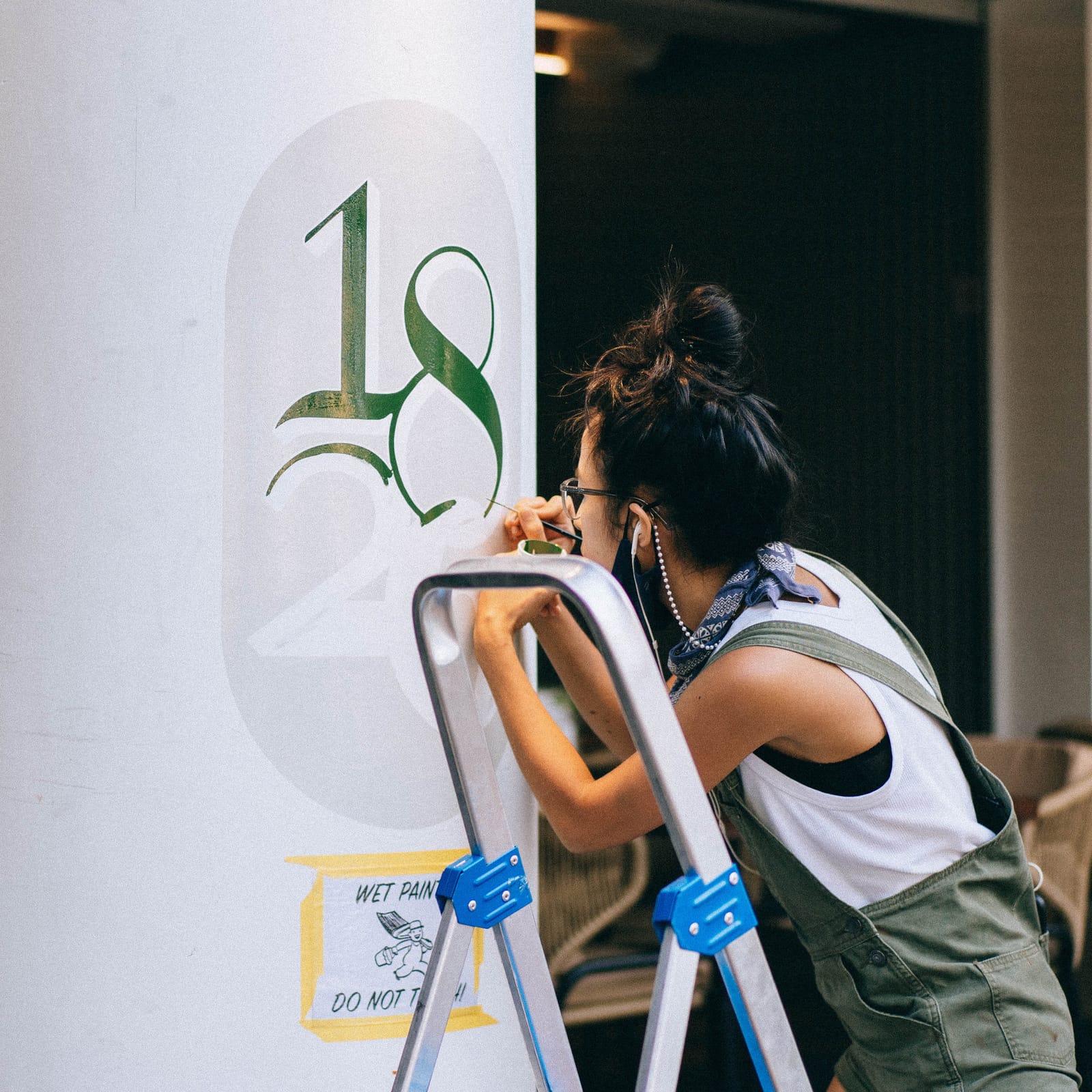 Charmaine Chen on the brush for the Singapore bar and restaurant 1826. LocationSingapore Years in the TradeTen (the last two full-time) Training- Various sign painting and gilding workshops
What did your career path to sign painting look like?I was living in Sydney, studying industrial design. It was during my time there that I realised what I relished was any tactile work that I could do with my hands. I got acquainted with some industrial designers who I worked for casually—sanding, spraying, and bending various materials, in exchange for a studio space. The owner of my local coffee shop asked me if I was keen to paint a sign and some menu boards. This was right about the time that I chanced upon a poster of a design studio that was holding sign painting classes for beginners. I went for it and I haven’t stopped painting since. 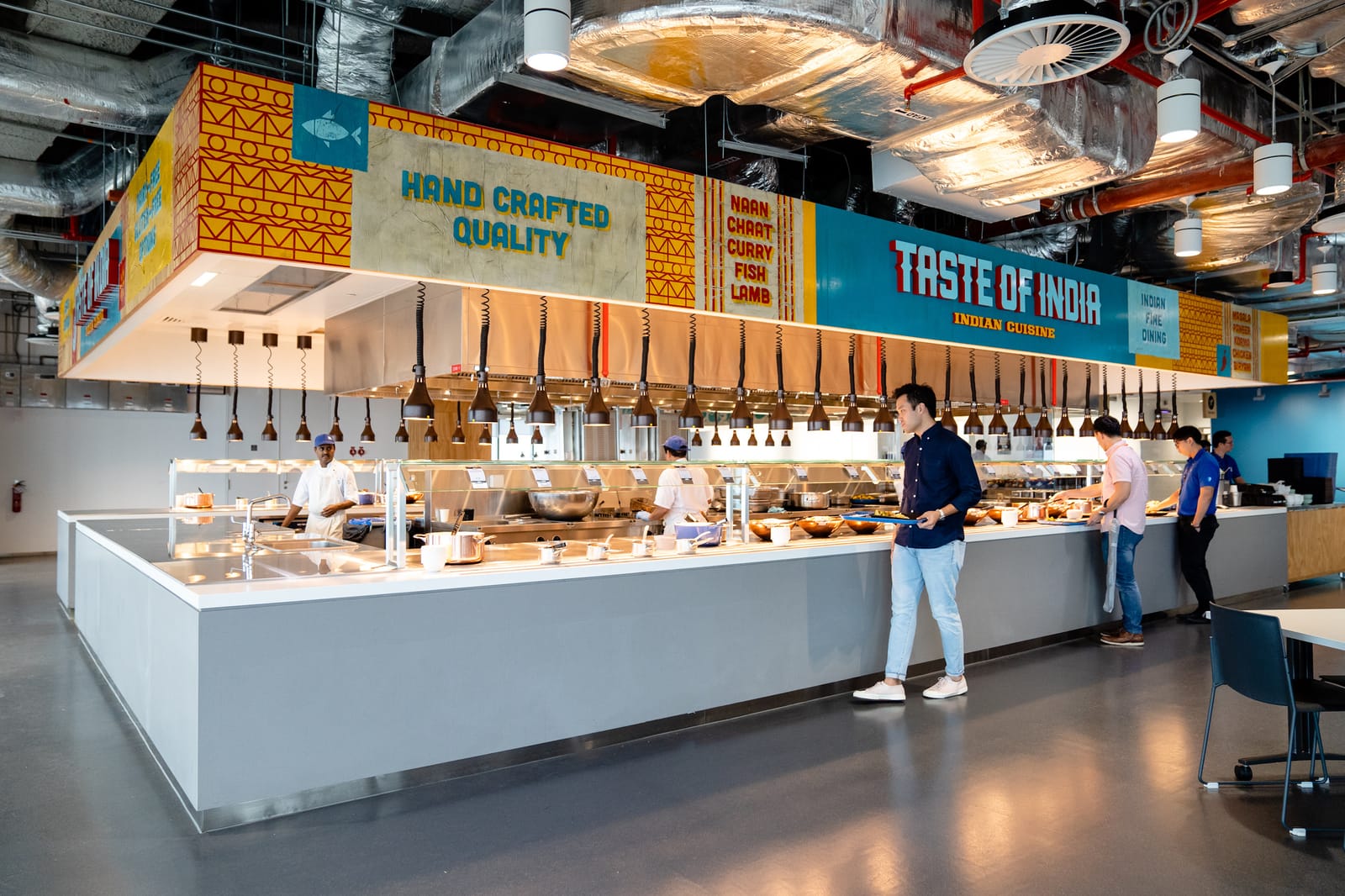 The 'Taste of India' eatery in the Facebook cafeteria, painted with 1 Shot enamel on plywood, with elements of wheat-pasted newsprint and 3D extruded lettering. My first proper job in Singapore after university was at a theme park as a scenic painter for two years. Our team entered the park after-hours and retouched everything. Our task each night was to make the park look fresh for visitors each day. The graveyard shift eventually took its toll on me, so when another opportunity arose, I took it and found myself working as a customisation craftsperson with a French luxury label that produces hand-crafted luggage and bags. The learning curve was a little steep, but before I knew it, I had spent four years there, mostly working on hand-painted monograms and customisations. All this time, I freelanced as a sign painter, either after-hours or on weekends. What advice would you give to anyone just starting out?Go for a course or a Letterheads meet, or reach out to another sign painter! The community is amazing, and I feel like it can be tough if you don’t have any guidance to benchmark your progress. Ask lots of questions and make notes of any mistakes that you make—I find that I learn at least one new thing on every job I do. Charmaine Chen used various shades of gold leaf use for this wedding memento for my sister, and this Persuasive Design Agency piece for an exhibition. I also love documenting anything that catches my eye. Ideas come to me from all sorts of weird places—anything from my grandfather’s stinky Chinese ointment bottle to a seemingly dodgy painted sign hanging on for dear life in an abandoned car park. Charmaine Chen / @oldworld_charm
Ira Senatos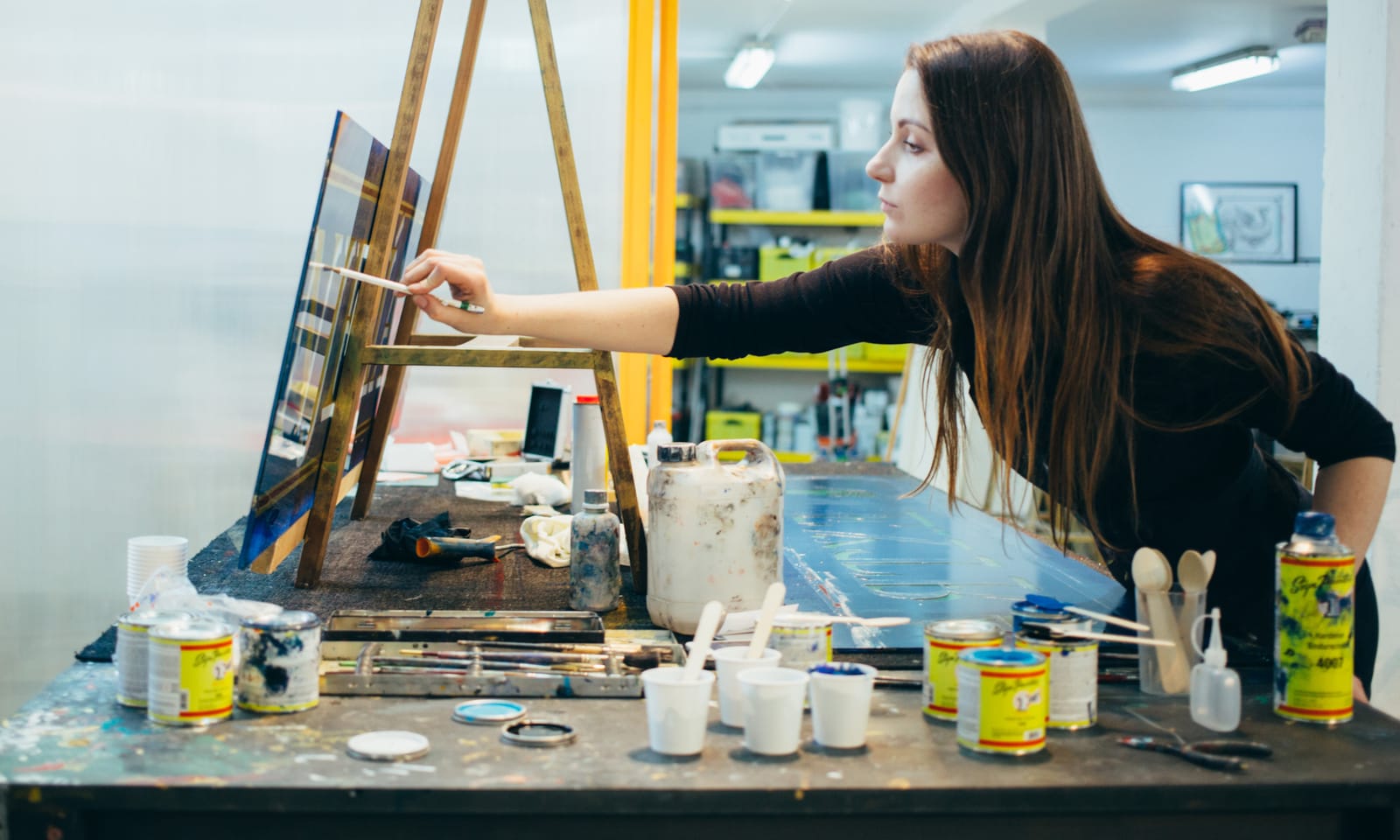 Ira Senatos at her studio in Madrid, Spain. LocationMadrid, Spain Years in the TradeTen TrainingCan you describe your career path leading to sign painting?While I graduated as an Advertising and PR specialist, my lifelong passion for drawing, cultivated since childhood, played a significant role. I think sign painting kind of combines these two professions, and embodies a creative approach to marketing materials. Coffee Records sign by Ira Senatos in her home town of Kyiv, Ukraine, and one of her 'It's a Sign' exhibition pieces for the creative space at Espacio Párpado that she shares with other artists. I relocated from Ukraine to Spain at the age of 20 to study. Faced with a language barrier, I began offering drawings to local coffee shops and bars, including illustrations for menus and promotional materials. During the chalkboard boom, I found myself drawing on large blackboards and experimenting with lettering, despite having no formal knowledge of it at the time. I began with using POSCA markers and sprays, and later learned gold leaf gilding techniques and other valuable knowledge from Diego at Rotulacion a Mano. Continuous learning through books and the internet remain a constant part of my artistic development. Prohibido Terminantemente el Cante (singing strictly prohibited) is Ira Sentanos' tribute to an antique piece seen in a bar in Seville. Casa Sarelu was a private commission for a wedding gift. What challenges have you faced while working in the trade?The language barrier was a significant challenge for me. Additionally, there was minimal demand for gold signs in Spain when I started, with only a handful of sign painters using gilding techniques in the entire country. We have helped to create the demand, but it has taken time for customers to recognise the value of our craft. Ira Senatos / @irasenatos
Interviews by Lauren Kerbel / @torontosignpainter Thank you to all the sign painters that shared their experiences and work for this feature. Now it's your turn!
Join BLAG today and receive BLAG 03 and BLAG 04 straight away. That's 144 advertising-free pages to start your 2024 adventures in sign painting.
More PeopleMore Learning
|
